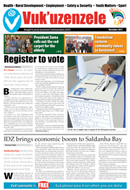Nov 2013
Nov 2013 Estelle GreeffRegister to vote
Register to vote sadminIt’s been almost 20 years since the historic elections of 1994, which gave all South Africans the opportunity to have their voices heard.
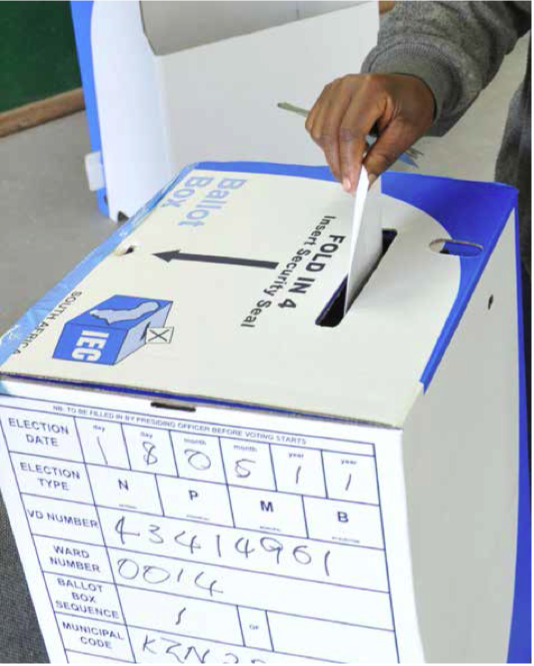 By casting their votes, South Africans elected a government of their choice, which has helped improve their quality of life over the past two decades.
By casting their votes, South Africans elected a government of their choice, which has helped improve their quality of life over the past two decades.
Citizens will have an opportunity to strengthen the country’s democracy by making their mark at the ballot box next year. But they will only be able to do so if they are registered to vote.
Nineteen-year-old Ntombikayise Tshabangu is one of those looking forward to casting her vote for the first time in next year’s election.
To qualify as a voter, Tshabangu must first register on the voters' roll. She is one of the young people born at the dawn of our democracy and targeted by the Independent Electoral Commission (IEC) in its registration drive. Tshabangu says next year’s elections should be very significant, especially for those born after 1994”.
“We are the first generation to benefit from the freedom and democracy our parents fought for. We are the ones who now carry the hope for a better life in a country where everyone can enjoy the fruits of liberation. We are now participants in a real democracy.”
But a study conducted in May by the IEC and Statistics South Africa found that only 10% of 18- and 19-year-olds in the country were registered as voters.
By the end of September, only 162 250 people in this age group had registered on the voters' roll, according to the IEC.
The IEC will pay special attention to this age group in its drive to increase the number of people who qualify to vote in next year’s election from 23 million to 25 million, the largest number of voters since 1994. Eligible voters have a chance to register at voting stations from 9 to 10 November. Voters can also register at Municipal Electoral Offices during office hours.
According to the IEC website, the largest number of registered voters on the voters’ roll are between the ages of 30 and 39, representing more than five million people.
This group is followed by those aged between 20 and 29, representing over 4.5 million registered voters.
The IEC has appealed to those who have moved to other areas to reregister and become eligible to vote in their new residential areas. The message for the upcoming elections is “2014 Elections: I vote South Africa - 20 years of Democracy.”
Tshabangu, a second-year marketing student at the Tshwane University of Technology, who hails from Mpumalanga, says she is very happy to be casting her vote for the fi time, especially since the country is celebrating its 20-year anniversary of democracy.
“It is very important that everybody casts their vote as every single vote makes a difference.”
She went on to say that voting was important as it gave every citizen a chance to influence how the country is run.
“We choose leaders who can relate to our ideas and believe in our beliefs. Our leaders should have a progressive mindset. I think it is important to weigh the issues, the candidates and to choose the best person for the job.”
The IEC has said there will be 22 264 voting stations compared to the 20 859 in the 2011 local government elections.
The IEC has increased its voting station network by 9.4 % as compared to the 2011 local government elections.
The IEC says that the number of people on the voters' roll had risen by 21.3% since it was first compiled in 1998.
Registering to vote
- You only have to register once as a voter, unless you move or your voting district changes.
- To qualify as a voter, you must be a South African citizen, be at least 16 years old and have a green, bar- coded ID book or a Smart ID Card.
- You can either register to vote in the voting district where you live or apply for registration at your local Municipal Electoral Office during office hours, but you must phone first to arrange a time. You can't register at the IEC national or provincial offices.
- You only have to re-register when your home address changes or when the IEC informs you that the voting district has changed.
- You can check your registration de- tails by sending an SMS with your ID number to 32810 or using the IEC’s voter registration web page.
IDZ brings economic boom to Saldanha Bay
IDZ brings economic boom to Saldanha Bay sadminSaldanha Bay stands on the verge of a major economic boom following President Jacob Zuma’s declaration of the area as an Industrial Development Zone (IDZ).
With the launch, the port of Saldanha in the south western coast region of the Western Cape is set to become an oil, gas, marine repair engineering and logistics services complex.
Trade and Industry Minister Rob Davies said a feasibility study had shown that Saldanha Bay was strategically located to serve the oil and gas sector on the African continent due to an increasing number of oil rigs requiring maintenance and passing by the West Coast to the East Coast of Africa. The focus on oil and gas facilities will include maintenance and repair, fabrication, supply and other services. The study, Minister Davies added, found that the IDZ had the potential to create 11 975 new jobs.
The IDZ is an industrial area linked to an international sea port which has areas that are suited for the manufacturing and storage of goods to boost beneficiation investment, economic growth and the development of skills and employment.
Minister Davies said the feasibility study confirmed that the Saldanha Bay IDZ project had huge potential for helping to lift South Africa's economy onto a higher industrial growth path.
“According to the study, the project has the potential to make a contribution of 86 per cent to the Gross Geographic Product and create approximately total (direct, indirect and induced) jobs; additionally the Saldanha Bay IDZ is likely to attract foreign direct investment worth approximately R9.3 billion over 25 years.”
Minister Davies said the oil and gas sector was one of the priority sectors of South Africa's Industrial Policy Action Plan (IPAP), adding that the IDZ would also help to advance the objectives of the country's National Development Plan.
Allan Winde, Western Cape MEC for Economic Development, said the Saldanha Bay IDZ would help stimulate the economy of the province. “Our vision is to establish the Western Cape as the oil and gas hub for Africa and the Saldanha Bay IDZ is crucial in achieving this objective.
“We are aware of several programmes, including our own Artisan Development Programme, which aim to build skills in the oil and gas industry.”
The Saldanha Bay IDZ is one of the 18 strategic integrated projects (SIPs) of the Presidential Infrastructure Coordinating Commission.
Saldanha Bay becomes the fourth operating IDZ after Richards Bay in KwaZulu-Natal, as well as East London and Coega, both in the Eastern Cape.
President Zuma rolls out the red carpet for the elderly
President Zuma rolls out the red carpet for the elderly sadminIt was a day of joy and laughter at the Sefako Makgatho Presidential Guest House when President Jacob Zuma hosted elderly men and women for lunch to mark the start of Older Persons Week.
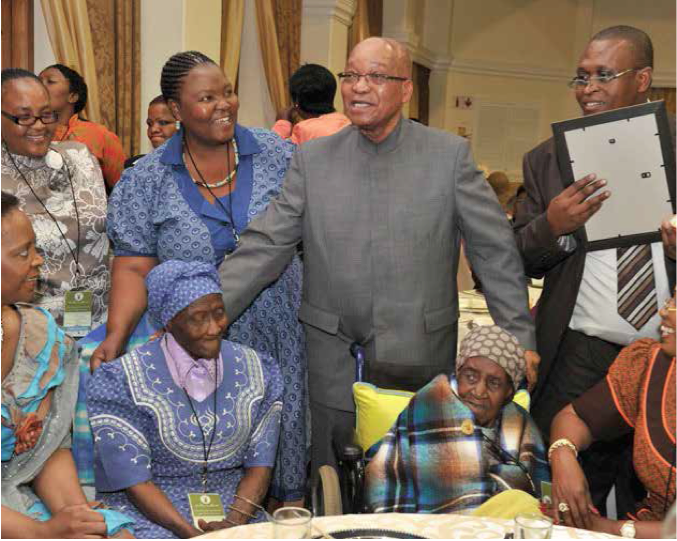 The elderly arrived from all nine provinces of the country - some aided by walking sticks and others in wheel- chairs – but all dressed up in their Sunday best.
The elderly arrived from all nine provinces of the country - some aided by walking sticks and others in wheel- chairs – but all dressed up in their Sunday best.
Among the guests was 130-year-old Johanna Rametsi of Hammanskraal in Pretoria, reputed to be the oldest person in South Africa. Ramatse was accompanied by her 95-year-old daughter Wilhelmina Phiri.
It was a festive occasion, which saw the President take to the dance floor with some of the elderly, with music provided by the South African National Defence Force band, bringing back memories of youthful days.
The President came bearing gifts - including chocolates, blankets and bath products - to thank the elderly for their contribution to South Africa, bringing smiles to his guests.
President Zuma used the occasion to call on South Africans to respect the dignity of older persons. “We get together this time each year to reaffirm that our citizens are important to this country and should be taken seriously.”
This year, Older Persons Week was celebrated from 29 September to 6 October under the theme ‘The future we want, what older persons say’. The International Day of Older Persons was celebrated globally on 1 October, a day designated by the United Nations in 1990.
These celebrations are meant to shine a spot- light on the rights of older persons, especially their right to dignity – and to combat the abuse of the elderly. Since the dawn of democracy, government has ensured that every elderly person receives the same old-age grant irrespective of race.
Government has significantly changed the lives of older persons for the better through the provision of free essential services such as water, health, housing and energy in various municipalities and districts.
Government calls on communities to defend women and children
Government calls on communities to defend women and children sadminThe 16 Days of Activism of No Violence against Women and Children campaign will run from 25 November to 10 December to heighten efforts to protect women and children from violence. The campaign, now in its 14th year, is headed by the Department of Women, Children and People with Disabilities (DWCPD).
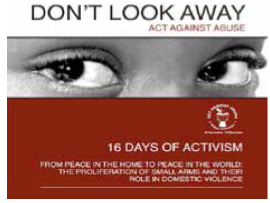 This year the department calls on all South Africans to play their part in stamping out violence in their homes and communities. According to DWCPD Deputy Minister Hendrietta Bogopane-Zulu, all South Africans should ask themselves the following questions. “Am I an abuser? Do I beat up my wife or husband? Am I a good role model for my children? South Africans should use these 16 days to reflect on themselves and their behaviour. “Change begins at home,” she said.
This year the department calls on all South Africans to play their part in stamping out violence in their homes and communities. According to DWCPD Deputy Minister Hendrietta Bogopane-Zulu, all South Africans should ask themselves the following questions. “Am I an abuser? Do I beat up my wife or husband? Am I a good role model for my children? South Africans should use these 16 days to reflect on themselves and their behaviour. “Change begins at home,” she said.
One of the campaign’s major achievements this year is the launch of the Zazi Know Your Strength programme which targets teenage pregnancy in the country, and derives from the Nguni word meaning know yourself. The programme encourages young women to take charge in the prevention of HIV, draw on their inner strength and create the life they want to live - an HIV-free life.
Zazi will be rolled out in the Gert Sibande district in Mpumalanga, an area where it is common for old people to have sex with young girls, resulting in teenage pregnancy and a high HIV prevalence amongst young girls, revealed the Deputy Minister. “The ratio of infections amongst girls aged between 10 and 18 is 1:1. This means that every second girl over the age of 10 is HIV positive, and the majority of the girls have had terminated pregnancies more than once.”
To raise awareness and tackle the challenges facing the community, DWCPD together with the department of health, has sent officials to work in the community to educate young girls on HIV prevention.
A massive green ribbon of hope will be launched symbolising communities uniting to tackle social ills that affect children and young women. The department also called on men to stand up and join the Brothers for Life campaign - a band of brothers who inspire men to stand up against abuse.
New offices bring smart ID cards closer
New offices bring smart ID cards closer sadminFollowing the launch of the Smart ID Card in July, the Department of Home Affairs has stepped up efforts to open offices dedicated to processing Smart ID applications.
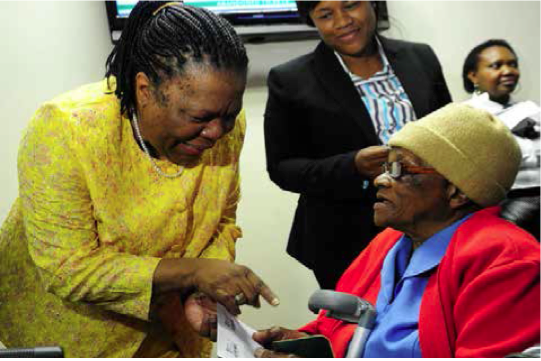 Twenty-six new offices will be opened across the country this month, bringing the total number of offices customised for Smart ID Card applications to 29.
Twenty-six new offices will be opened across the country this month, bringing the total number of offices customised for Smart ID Card applications to 29.
Three offices were opened last month to start issuing Smart ID Cards to members of the public.
The three offices are Byron Place in Pretoria, Harrison Street office in Johannesburg and Barrack Street office in Cape Town.
Home Affairs Minister Naledi Pandor used the opening of the new offices to hand over Smart ID Cards to a number of selected senior citizens to honour their role in the development of the country. This coincided with Older Persons Week celebrated from 29 September to 6 October.
Minister Pandor said the offices had been specially converted to process Smart ID Card applications. “We said that the offices would only be opened to the public once they were properly outfitted with the Live Capture System and servers that are connected to the national database. This has been done.”
But the Minister added that the applications would initially be limited to designated groups. “We are starting with a pool of around a 100 000 made up by first time applicants – 16 year-olds who do not have IDs at the moment, senior citizens who are sixty years and over, we wish to focus on some of the leaders in the media who will be invited to enable them to communicate the message of this process with us.”
Once all the offices are opened members of the public will be invited to apply according to their month of birth. “We will announce that, I think early next year we will begin that public call per month of birth.”
Minister Pandor said Home Affairs staff had undergone training to enable them to handle the new system. “We took staff out for a number of days and we have been training over weekends, we continue to offer training within the premises in the department using the live capture booths.”
In a statement, the Department of Home Affairs emphasised that:
- Members of the public must wait to be invited to apply in accordance with their dates of birth
- The Smart ID Card will be issued free to 16 year-olds
- All other citizens are expected to pay R140.
The Smart ID Card is part of efforts introduced since the dawn of democracy to restore the national identity, citizenship and dignity of all South Africans. The Smart ID Card will help to combat identity theft, fraudulent activities related to driver’s licences and social grants, among other things.
Meanwhile, the Department of Home Affairs has announced that people who have duplicate ID numbers will no longer be able to use them. To check if you share your ID number with someone else, sms the letter D (for duplicate) followed by your ID number to 32551 or call 0800 60 11 90 or visit your nearest Home Affairs offices for assistance.
Social grants a lifeline to the needy
Social grants a lifeline to the needy sadminAfter spending almost 20 years as a domestic worker, Nompumelelo Mchunu* from Tembisa was looking forward to retiring at the age of 60.
She would take it easy, knowing that her four children would have long completed school and they’d be supporting themselves.
Little did she know that at the age of 75, she would still be playing the role of a parent - only this time, she is looking after her six grandchildren, who lost their parents due to HIV related illnesses. Her only surviving son, aged 46, is also unemployed.
Mchunu says the picture would be very different were it not for government’s grant for older persons and the child support grant she receives every month. With these she is able to take care of her family.
“The money [grant] will never be enough due to the high cost of living, but I’m so grateful to our government with the little we get.
“My kids left me with nothing to support their children, but thanks to these grants, we are surviving,” Mchunu says.
Through both the older persons and child support grants, her eldest granddaughter managed to complete Grade 12.
“My goal is to see them get an education and become fi independent, instead of relying on government to support them.”
She still remembers a time when people her age used to receive half of what they currently receive in grants.
“I can only imagine how people in the same situation like me survived then. Imali yeqolo yayingakakhushwa [there was no child support grant] and that’s why we must be thankful for the changes we’ve seen since 1994. I wouldn’t have survived without government’s assistance.”
Although Mchunu acknowledges that there are some areas in which government can improve, she urges people not to forget where they come from.
“So much has happened to change people’s lives. Slowly but surely, things will be perfect. We need to be patient.”
Securing social stability
Social grants remain the cornerstone of government’s key programmes to fight the poverty afflicting children, people with dis- abilities and older persons.
Since 1994, the social grants system has expanded from 2.7 million beneficiaries to over 15 million.
Among government’s achievements post 1994 is the extension of social grants, where the child support grant was added to support parents and guardians in need.
When it started, only children below the age of seven qualified for such a grant. This was expanded to children below the age of 14 and to date, qualifying parents with children below the age of 18 are now benefiting from the grant.
Another noted development in social grants since 1994 includes lowering the qualifying age for men to receive the older persons grant, from 65 to 60 years.
As from 1 October 2013, government has increased the monetary value of social grants. These include the older persons grant for senior citizens aged 60 to 74, the disability grant and care dependency grant, which increased from R1 260 to R1 270.
The older persons grant for ages 75 and older, and the war veterans grant increased from R1 280 to R1 290.
Other grants, which also increased from October, include the child support grant and the grant-in-aid, both from R290 to R300.
The foster child grant is currently R800.
Multiplying the benefits
During the recent International Day for the Eradication of Poverty, the Department of Social Development and its entities - the South African Social Security Agency and the National Development Agency - launched the Cooperative Shop Project.
The initiative is aimed at combating poverty by linking social grant beneficiaries (particularly the care givers of children receiving child support grants) and other vulnerable groups to meaningful socio-economic opportunities.
The department and its entities will identify co-operatives that need support, with the intention to develop the skills of the co-operative members to ensure they are able to produce goods of quality.
Social Development Minister Bathabile said the project could be seen as an addition to the grants.
“The primary intention is not to take people out of the grant system but to provide opportunities for grant beneficiaries to supplement their income.
“However, if the project is a success, the members of the cooperatives may well earn enough to support themselves and their families and thus, move out of the social security system,” Dlamini said.
*Name changed to protect grandchildren's identity.
-
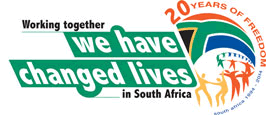 The number of South Africans who receive old age grants increased from 1.9 million in 1997 to 2.9 million in 2013.
The number of South Africans who receive old age grants increased from 1.9 million in 1997 to 2.9 million in 2013. - More elderly people now receive an additional grant to pay people who take care of them. The number of people who receive this grant-in-aid increased from 9 183 in 1998 to 75 274 in 2013.
- The total number of South Africans receiving social grants increased from 3 million in 1997 to 15 million in 2013.
Source: South African Social Security Agency
SA steps up war against TB
SA steps up war against TB sadminSouth Africa will use the R3 billion it recently received from the Global Fund to intensify the fight against Aids, tuberculosis (TB) and malaria.
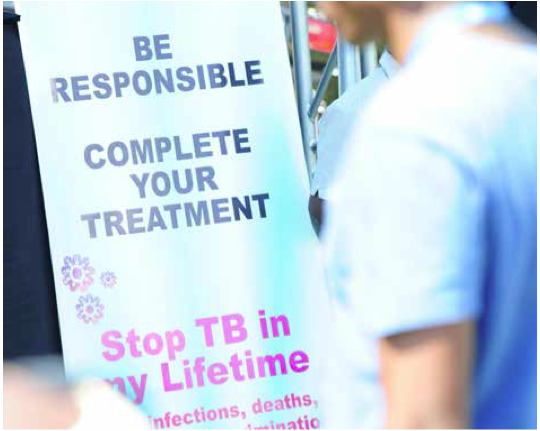 Health Minister Dr Aaron Motsoaledi said 52% of the money, amounting to 1.56 billion would go to the department and the rest to civil society groups working with Aids, TB and malaria.
Health Minister Dr Aaron Motsoaledi said 52% of the money, amounting to 1.56 billion would go to the department and the rest to civil society groups working with Aids, TB and malaria.
The Minister said the money would enable his department to target high-risk groups in its quest to stamp out TB.
"We are going to be able to do in all Correctional Service facilities in the country what was done in Pollsmoor Prison. That means every inmate will have to be screened, those who are suspicious will be taken through gene expert, those who have got TB will be put on treatment immediately and their families will be screened. Secondly it’s going to help us to decentralize MDR treatment."
According to the World Health Organisation (WHO), South Africa has the third highest burden of people living with TB, behind India and China.
The Department of Health estimates that more than 70% of people with active TB are also HIV-positive. Statistics South Africa has identified TB as the number one cause of death.
But South Africa is facing this challenge, and winning this fight.
“TB was the leading underlying natural cause of death for both males and females in all provinces, except Free State and Limpopo, and among those aged 15 - 64 years,” said Statistician-General, Phali Lehohla.
Minister Motsoaledi leads offensive against TB
But Minister Motsoaledi remains optimistic that South Africa will reach its Millennium Development Goal of halving TB infections by 2015.
The Minister has positioned South Africa at the forefront of global efforts to eradicate TB. He has championed the fight against TB in the mining sector throughout southern Africa.
Heads of State from the Southern African Development Community (SADC) signed the SADC Declaration on TB in the Mining Sector, which was endorsed beforehand by their national ministers for health, labour and justice.
Minister Motsoaledi was recently appointed chairperson of the Stop TB Partnership Coordinating Board – an international body which assists in the fight against TB. In accepting this position, he said his vision was to have zero TB deaths and zero new TB infections.
Tabling his departmental Budget Vote early this year, Minister Motsoaledi said the health database had 405 000 families in South Africa who had a member diagnosed with TB.
He revealed that South Africa’s TB cure rate had improved from 67.5% in 2008 to 75.9% in 2012.
The target set by the WHO is 85%. “We are steadily but surely moving in that direction,” said Minister Motsoaledi.
New strategy fights TB on a global front
South Africa’s efforts to combat TB will be boosted by the new Roadmap for Childhood TB towards Zero Deaths adopted recently by the WHO. The strategy aims to save 74 000 children around the world who could die from TB.
The Roadmap estimates that R1.2 billion per year is needed to make a major impact in saving the lives of children, including those infected with both TB and HIV.
The WHO said more than 200 children under the age of 15 die needlessly from TB – a disease that is preventable and curable.
The Roadmap builds on the latest knowledge of the disease and identifies clear actions to prevent these child deaths.
“Any child who dies from TB is one child too many,” said Dr Mario Raviglione, Director: Global Tuberculosis Programme at the WHO. “TB is preventable and treatable, and this roadmap focuses on immediate actions governments and partners can take to stop children dying,” said Raviglione.
The money to fight TB will come from donors and governments.
The funds will also go towards improving detecting, developing better medicines for children and integrating TB treatment into existing maternal and child health programmes and getting more paediatric health professionals to actively screen for TB with better tools. The Roadmap recommends 10 actions that different countries and global leaders in TB should follow.
The Roadmap requires countries to collect and report better data, including preventive measures and to develop training and reference materials on childhood TB for health workers.
It also calls for local expertise and leadership among child health workers at all levels of health systems to be beefed up.
New school received with jubilation in Lusikisiki
New school received with jubilation in Lusikisiki sadminThe newly-built Tshantshala Senior Primary School (sps) in Gugwini village, just outside Lusikisiki, stands as a beacon of hope for the local community as they know that their children now have a decent place to learn.
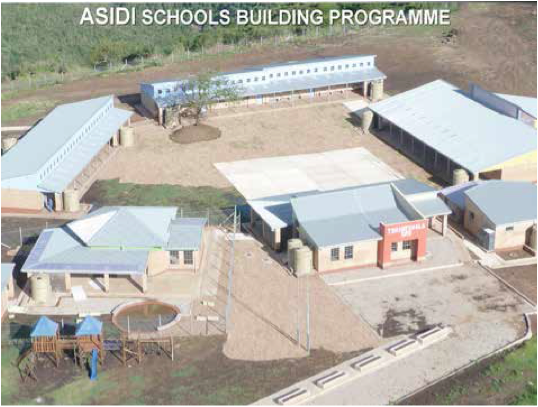 The new school boasts, among other things, 14 classrooms and two water tanks. It cost of R9 million.
The new school boasts, among other things, 14 classrooms and two water tanks. It cost of R9 million.
Prior to the school being opened, learners in Gugwini used to travel more than 10 kilometres to attend school in neighbouring villages.
The school currently has 134 learners and four educators. One teacher is permanent and three are temporary.
Deputy Minister of Basic Education Enver Surty told the locals he had no doubt in his mind that building the school in the area was the right thing to do.
“Government took a decision that no child should continue learning under trees or in mud schools. Education is the only way to break the cycle of poverty. Poverty should not be an excuse not to study further,” he said.
Deputy Minister Surty urged parents to encourage their children to stay in school, and play an active role in their education.
Tshantshala joins the list of brand new schools that have been opened as part of the ‘One school a week’ campaign, which has seen the opening of Notsolo SPS, Mqokolweni SPS and Ndlovayiphathwa SPS, among others, as part of the programme.
In total, 16 schools have been built and handed over.
The Deputy Minister told local communities that government was also committed to ensuring that every child attends school.
“Our task as government is to ensure that what happens in the classrooms is supported by parents and the community at large."
A teacher at the school, Zandile Magobongo, said the new building had made teaching more exciting.
“In the past, we used to teach under difficult conditions. The learners were crammed in one classroom and they were unable to concentrate.”
Magobongo said the learners were now more interested in learning.
Before the school was built, the learners were housed in a local church after the structure that they were using was blown away by strong winds.
A parent who has two children at the school, Masisile Manzhele said she was happy with the school.
“I’m happy that my kids will learn in a safe environment and that they will no longer have to travel to neighbouring villages for school,” she said.
A Grade 3 learner at the school, Siphokazi Mbele, was excited to be in the new school.
“I want to be a teacher when I finish school,” she said.
ASIDI
About 50 schools are to be built through the Accelerated School Infrastructure Delivery Initiative (ASIDI). The schools will accommodate more than 10 000 learners in the Eastern Cape where President Jacob Zuma has already opened four schools.
ASIDI aims to replace inappropriate school structures, address basic services backlogs and the provision of these services. It forms part of government’s 13th Strategic Infrastructure Project (SIP), which relates to the rebuilding of schools.
Before 1994, South Africa had a large number of schools without water, sanitation and electricity, the bulk of the challenge being in the Eastern Cape.
The R8.2 billion public-private ASIDI programme aims to eradicate the 496 mud schools in the country, provide water and sanitation to 1 257 schools and electricity to 878 schools by
March 2016.
As part of the national ASIDI rollout, mud schools in the Eastern Cape will also be replaced with more appropriate structures, and schools will be upgraded to optimum functionality through the provision of core spaces such as libraries, laboratories and administration blocks.
Student fund rescues needy students
Student fund rescues needy students sadminIn 1990, after Cynthia August was admitted to study for a teaching degree at the University of Fort Hare, she battled to pay for her tuition, buy books and still focus on her studies.
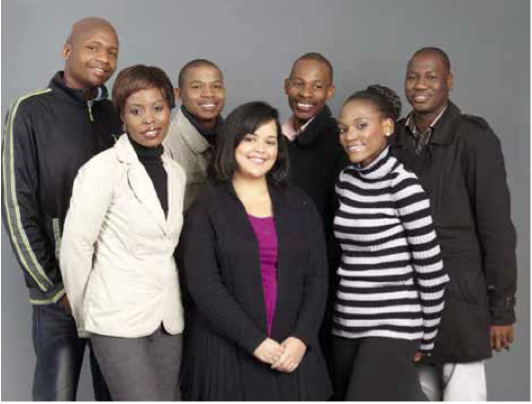 But the following year, she was among the first group of students to be financed by the National Student Financial Aid Scheme (NSFAS). August says without the scheme, she wouldn’t have achieved her ambition. “I believe that if it was not for NSFAS I would not have become who and what I am today.”
But the following year, she was among the first group of students to be financed by the National Student Financial Aid Scheme (NSFAS). August says without the scheme, she wouldn’t have achieved her ambition. “I believe that if it was not for NSFAS I would not have become who and what I am today.”
August obtained her degree and went on to become the Head of Department at Hankey Secondary School in the Eastern Cape. Today she is also a councillor for Youth, Education and Gender Affairs in the Gamtobaqua KhoiSan Council and actively encourages and assists learners in applying to tertiary institutions with the help of the NSFAS.
More recently, Vuyane Mhlomi’s dream of studying medicine at the University of Cape Town was dampened by his concern over whether his single mum from Khayelitsha could afford his fees.
But in 2006, after being admitted to the School of Medicine at the University of Cape Town, Mhlomi secured finance from the NSFAS.
The NSFAS is a government student loan and bursary scheme that has provided study loans and bursaries to over a million students from across the country since 1991.
Mhlomi remains grateful for the assistance. “The ultimate indicator of my achievement and success was the ability to study towards the career of my choice and through it I created positive changes in my community. Without financial barriers, I’ve been able to reach my full potential, and I have had the opportunity to meet and work with some of the leading minds in the world. I shudder to think that a little over 20 years ago, equally talented people were denied the opportunity of higher education due to a lack of financial support.”
Like August and Mhlomi, thousands of students wanting to study at any of the 25 public universities and 50 public FET colleges throughout the country now have an opportunity to realise their dreams.
A major milestone for the NSFAS was the introduction of the Final-Year Programme in 2011. This ensured that students have their final-year loans converted into a 100 per cent bursary if they passed their final-year courses and qualified to graduate. Through this new programme, government pledged R851 mil- lion which benefited 28 464 students. The programme encouraged students to focus on graduating without having to worry about re- paying their entire loans and allowed them to start working to repay the loans back quicker, enabling them to help other students who also needed financial aid.
What is a student loan?
A student loan is the money you borrow from NSFAS to cover the costs of your studies at any of the institutions of higher learning in South Africa. The costs include tuition fees, residence or private accommodation costs, food, books and travel. This loan must be repaid to the NSFAS when you have finished studying. Depending on your results, up to 40% of your the NSFAS study loan may be converted into a bursary.
The NSFAS has very reasonable repayment terms, which are based on what you earn after you leave university. All loans that are repaid are used to fund other students who also need financial assistance.
How do I apply for NSFAS finance?
Apply for a NSFAS study loan at the institution of your choice or directly through NSFAS by filling in the application form at www.nsfas.org.za and sending it to NSFAS, Private Bag X4, Plumstead, Cape Town, 7801.
-
 The number of new students educated through NSFAS finance increased from 7 220 in 1991 to 199 479 in 2012.
The number of new students educated through NSFAS finance increased from 7 220 in 1991 to 199 479 in 2012. - The money NSFAS paid out to students increased from R3.2 billion distributed to helping 29 176 students in 1999 to R8.2 billion to help 200 000 students enrol this year
- In the 2012 academic year, the NSFAS lent R7.5 billion. Of this, R1.7 billion was for bursaries for FET college students and the rest for loans/bursaries to university students.
Source: NSFAS
Ostrich farmer breeds new business talent
Ostrich farmer breeds new business talent sadminFollowing a successful career as an ostrich farmer, Felicity Fillies is now looking to breed a new generation of entrepreneurs.
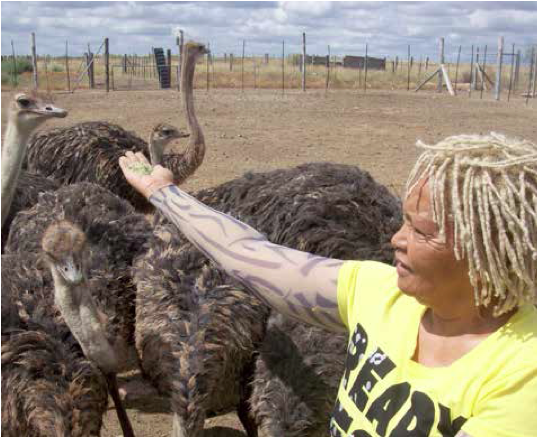 Fillies, who is a teacher-turned-ostrich farmer, runs one of the most successful ostrich farms, Nieuborn Ostrich Farm, in the country and farms hundreds of ostrich per season for meat and leather.
Fillies, who is a teacher-turned-ostrich farmer, runs one of the most successful ostrich farms, Nieuborn Ostrich Farm, in the country and farms hundreds of ostrich per season for meat and leather.
Now, with the launch of the Power of One - a new entrepreneurship project for high school girls in De Aar in the Northern Cape – Fillies has made youth entrepreneurship her priority. As part of the project, 20 Grade 11 learners from De Aar will be mentored by Fillies on entrepreneurship.
The girls were chosen from four schools in the area and are all doing business studies as a subject. Fillies will carry out mentorship workshops teaching the youngsters how to be business-minded and think like entrepreneurs. She is currently also in talks with the Department of Basic Education to expand this pro- gramme so other local successful entrepreneurs can pass on their expertise, experience and business skills to learners across the country. The De Aar girls will work with Fillies until they matriculate.
Born in Colesberg and raised by her grandparents, Fillies decided to become a teacher.
She obtained a Bachelor of Arts degree from the University of South Africa and a Bachelor of Education degree from Free State University before returning to her hometown to teach at her old school, Orion High in De Aar. Through various community involvement projects, she soon developed a passion for uplifting and helping others, so she quit her teaching job in 1996 and became a district councilor.
Being a woman who thrives on challenges, Fillies was dared by a friend to take up ostrich farming. She decided to give it a go in 2004 and has never looked back.
To get her started she was given six ostrich chicks by a nearby farmer. “I became so interested in ostriches and was very eager to learn more. I wanted more birds, but could not afford them.”
Fillies started selling her prized possessions to raise capital and bought 100 baby birds after selling her dining room set.
Her business grew from strength to strength as she supplied meat to Klein Karoo International, which distributed it throughout the country. In 2005, she won the top female farmer of the year award from the Department of Agriculture.
Fillies also scooped the award for top producer for informal markets. This marked a turning point in her business and she became an extremely well-known ostrich farmer locally and internationally.
Fillies then became the first black member of the South African Ostrich Board. Today she is also one of the Small Enterprise Development Agency's (Seda) top 80 businesses in the country.
Seda assisted Fillies in drawing up a business plan, set up her company website and more. She also received assistance from the Department of Agriculture, Forestry and Fisheries which supplied her farm with an animal feed plant, adding further value to her business.
Her success has allowed her to visit China, America, India, Singapore and Thailand to promote her ostrich farm and products.
As a result, her business is also promoting the Brazil, Russia, India and China (BRICS) summit objectives of stimulating growth and tackling poverty in the country.
Today she runs a successful international-farming cooperative, sells approximately a 1 000 birds each season and employs 10 full-time workers. She also produces and sells animal feed to local farmers.
Despite her love for ostrich farming, Fillies says the ostrich business in South Africa is extremely difficult. In 2011, after a bird flu outbreak in Europe, ostrich meat was banned from the European Union countries. The ban saw almost 50 smallholding ostrich farmers in the country go under.
Even though her business took a serious knock, Fillies diversified and extended her business to produce products such as handbags, fascinators (a hat made of ostrich feathers) and corporate gifts. Despite the ban remaining in force, Fillies is still able to export cooked ostrich meat to Europe but this comes at quite a high export cost.
“I am always searching for new opportunities and am still learning a great deal about ostrich farming and the greater ostrich product market. Each day I explore new frontiers and meet new clients and business prospects for which I am thankful.”
The secret to success, says Fillies is to have the right mindset. “You need to be positive, hard working, and never ever give up."
Through her new project, she hopes to empower young women in the province to reach their full potential.
E Cape man's chicken business hatches
E Cape man's chicken business hatches sadminAfter having several of his business plans thrown into the bin by financial institutions, Eastern Cape businessman David Jacobs found himself unable to kick-start his chicken business because no-one believed in his vision.
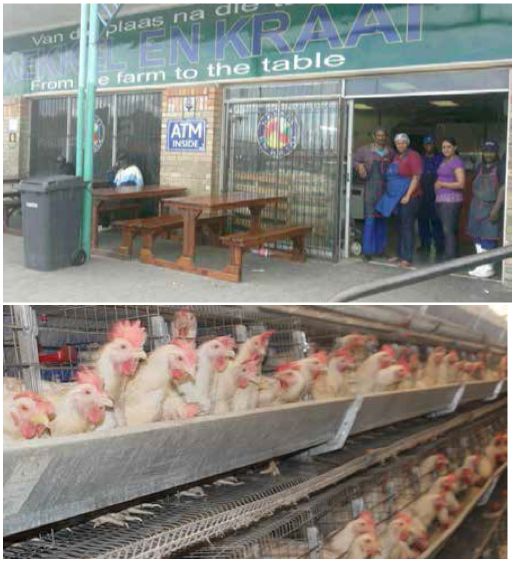 But his fortunes changed when the Eastern Cape Development Corporation (ECDC) gave him a chance, seeing that he had a wealth of experience in the retail and fresh produce market.
But his fortunes changed when the Eastern Cape Development Corporation (ECDC) gave him a chance, seeing that he had a wealth of experience in the retail and fresh produce market.
The ECDC gave Jacobs R500 000 in start- up capital to get his chicken business off the ground and almost a year later, the once demoralised businessman is in the process of opening a second franchise of the Kekkel en Kraai chicken outlet which specialises in fresh, frozen and grilled chicken.
For 12 years, Jacobs worked as a buyer of perishable goods at a leading retail chain and attributed his success to the experience and business lessons that he picked up along the way; lessons that also helped him understand his target market and how to keep the business afloat when sales are slow. “For years, I always wondered why I had to be the individual that was buying fresh and frozen chicken and sitting in that department for years and years, while my colleagues only stayed there for six months to a year.
“Now I understand why I had to be the one who was there for longer than everyone else. I’m now in the chicken business and the experience that I gained when I was employed is now serving me well.
“Without help from the ECDC, it would have been impossible to get this business off the ground. I had been to so many institutions who did not believe in my vision. ECDC took into consideration my vast experience in this industry and the determination I have to make this business a success,” he said.
And it was his 12 years of experience that really coined it for Jacobs, whose successful outlet in Uitenhage has hatched bigger returns. The corporation is now assisting him to open a new branch in Port Elizabeth.
Kekkel en Kraai opened its doors in October 2012, initially employing five people. The business now employs eight people.
Wayne Mahoney, the corporation’s senior account manager, said: “The business has demonstrated significant growth potential starting off with fi initial employees and growing to eight in under a year.
"Another key area is the location of the business. Kekkel en Kraai is situated at a taxi rank in Uitenhage, which makes the business accessible to many residents whom make use of public transport,” he said.
Police urge farmers to guard their livestock
Police urge farmers to guard their livestock sadminThe South African Police Service (SAPS) is urging livestock owners to be more vigilant following a steady increase in stock theft in recent years. Though the SAPS is making progress in dealing with the problem, stock theft across the country remains unacceptably high.
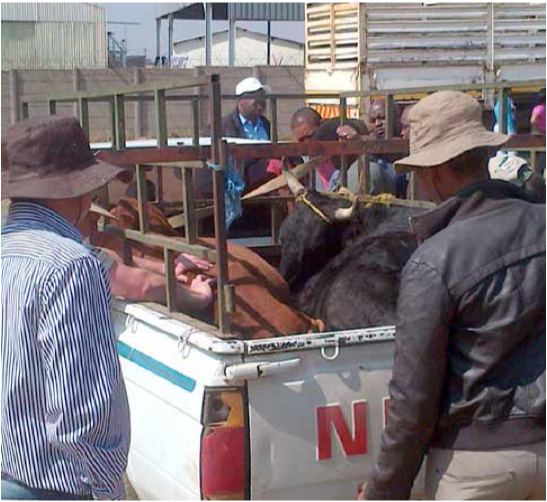 According to the SAPS Stock Theft and Endangered Species Detective Service (Stock Theft Unit), stock theft costs the economy millions of rands every year. The number of stolen animals, including cattle, sheep and goats increased from 171 078 in 2011/12 to 197 998 in 2012/13.
According to the SAPS Stock Theft and Endangered Species Detective Service (Stock Theft Unit), stock theft costs the economy millions of rands every year. The number of stolen animals, including cattle, sheep and goats increased from 171 078 in 2011/12 to 197 998 in 2012/13.
In an effort to combat the scourge, the SAPS is conducting awareness campaigns to educate communities and conducting cross-border operations to prevent theft of livestock.
“There are external forums such as the National and Provincial Stock Theft Forum as well as the Stock Theft Information Centre (STIC) at local level, where the communities are represented,” says head of the Stock Theft Unit Brigadier Vinesh Singh.
Brigadier Singh adds that stock theft is a nationwide problem that has negative effects, especially on small and emerging livestock owners.
One of the victims is Chief Samuel Ramugondo of Mukula village near Thohoyandou in Limpopo who has had many of his prized cattle stolen.
Ramugondo, who has lost 90 cattle since the beginning of the year, says the problem is not only confined to his village but affects surrounding villages as well.
Ramugondo says the theft has affected him so severely that he has lost count of how much livestock he has lost.
“Nationwide stock theft is costing South Africa hundreds of millions of rands annually and it is seriously hampering the empowerment of emerging livestock owners and threatening the profitability of all livestock owners,” he explained.
Brigadier Singh says KwaZulu-Natal, Free State and the Eastern Cape are the hardest hit by the problem. He says police cannot win the fight against stock theft on their own and community involvement is needed.
According to recent crime statistics stock theft has decreased, but it remains high. Theft declined by 35% from 2004 to 2013.
He says that thieves are becoming cleverer and employ different tactics across the country.
“For example unattended livestock is stolen from the grazing camps or kraals, removed to specific area, slaughtered or loaded and sold,” he warned.
Brigadier Singh urges livestock owners to report crime as soon as to the nearest police station.
Tips on how to take care of your livestock:
- Make sure that fences and gates are kept in good condition.
- Mark animals as prescribed.
- Count livestock regularly.
- Animals should be kraaled at night.
- Keep a proper livestock register.
- Make sure that livestock is properly looked after (herd boys).
- Report stock theft as soon as possible.
Foundation restores community values in Eersterust
Foundation restores community values in Eersterust sadminThe people of Eersterust in Pretoria are reviving community spirit by working with government to promote positive social values.
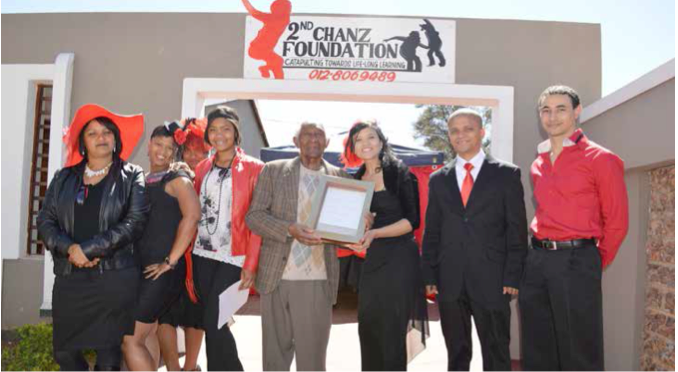 My Kassie 2nd Chanz Foundation is a non-profit organisation established to help the police to fi crime and to involve young people in developing their community.
My Kassie 2nd Chanz Foundation is a non-profit organisation established to help the police to fi crime and to involve young people in developing their community.
Since it was established in August last year, the organisation has been the beacon of hope for troubled young people in Eersterust and other areas with high levels of drug abuse.
To date, the organisation has helped about 300 people with opportunities for education and training and helping others to develop themselves and their communities.
Captain Breeda Koopman, a local police officer and one of the founders of the organisation, believes in community work and giving people a second chance.
“As a way of helping young people and giving those that were involved in crime and other youth from the community, we managed to secure five bursaries from the Gauteng Regional City Academy to study at the Further Education Training Tshwane South Institution.”
She added that the organisation also invited recruitment agencies to visit the community, which resulted in 30 people getting jobs.
One of the coordinators of the foundation, Bridgette Buys said: “The most common problem is unemployed youth who sell drugs to generate income so that they can take care of their children or parents who are unemployed.”
There is also a high pregnancy rate because of the lack of family planning.
Buys says the organisation works with the South African Police Service (SAPS) and the Department of Social Development to tackle social problems.
“We designed a programme called Gazat Make-over Programme – Turn a house into a Home. Our team first assesses the physical structure of the house. We look at the needs and emotional support a family requires and find out which government department can assist in the matter and most of the time we work very well with government.”
The foundation consists of a team of unemployed people whose role is to serve the community.
Captain Koopman said the community realised that pointing fingers when looking for solutions was not going to work and decided to look for solutions within. The foundation has representatives in different neighbourhoods of Eersterust who help look closely at problems, as opposed to the community assessing a problem from a distance.
“This approach increases the involvement of neighbours on an interpersonal level by meeting the people where they are at and with what they are comfortable with.”
The organisation’s achievements include securing a satellite office for government, which delivers services from South African Social Security Agency and Home Affairs, making state services more accessible to the community.
My Kassie 2nd Chanz Foundation was also a finalist in the South African Fundraising Awards in the small budget, big idea category.
Further plans include a mobile neighbourhood training and self-development centres, but the organisation will rely on private sector funding for this.
Captain Koopman called on other communities to build the nation, saying it is up to every South African to make the country better.
Sky's the limit for young cadets
Sky's the limit for young cadets sadminLocal aviation giants SA Express and South African Airways (SAA) have jumped on-board to train hundreds of young South Africans from disadvantaged backgrounds to become pilots.
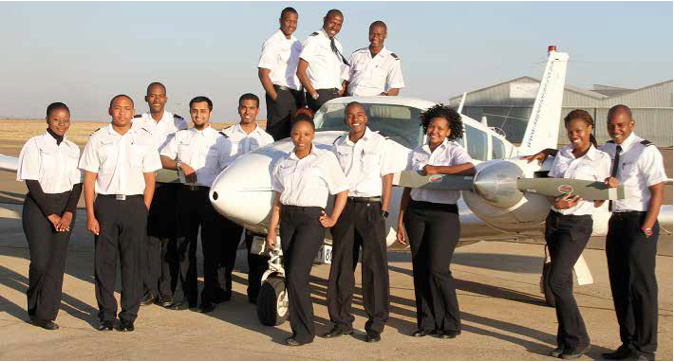 The two state-owned airlines have pooled their resources to create the first ever national pilot training programme for young black cadet trainees. The programme supplements the cadets’ tuition, practical training, flying time, accommodation and travel.
The two state-owned airlines have pooled their resources to create the first ever national pilot training programme for young black cadet trainees. The programme supplements the cadets’ tuition, practical training, flying time, accommodation and travel.
The new breed of cadets will have access to the country’s best instructors, will use state-of-the-art training and methods and will learn first-hand how to use and control some of the best technology available in aviation.
“SAA is aligned to government's employment equity objectives to accelerate skills development, so we have extended this programme to develop and empower our country’s youth,” said SAA Chief Executive Officer (CEO) Monwabisi Kalawe.
SA Express CEO Nati Tshanga says the programme will address the serious shortage of skills we have in the local aviation industry. “Although we are making strides, only 47 pilots out of the current 255 pilots are black, so there is still a lot to be done.”
The South African Civil Aviation Authority revealed in 2012 that there were currently 26 022 aviation personnel licence holders in the country, of which 2 776 were black, 670 coloured and 553 Indian.
Further examination revealed that only 4 458 of the licence holders were women, of which 1 668 were black, 383 coloured and 238 Indian.
SAA and SA Express last month held open calls for cadets to apply for the programme. Successful candidates will undergo 14 months of theoretical and practical training which will enable them to get an Airline Transport Pilot Licence.
This will be followed by approximately three years of internship.
Upon completion of the programme, the cadets will gain further experience and be able to apply for jobs.
The new cadet programme will boost the number of young black cadets in the country.
For more information on the cadet programme contact 011 628 0353.
Registering a business made easy by the dti and FNB
Registering a business made easy by the dti and FNB sadminBudding entrepreneurs will no longer have to stand in long queues coupled with endless paperwork when registering a business, thanks to an initiative between the Department of Trade and Industry, First National Bank and the Intellectual Property Commission.
The aim is to simplify registering a company and opening a business bank account in line with govrnment’s appeal for financial institutions to support SMMEs.
First National Bank (FNB) partnered with the Companies and Intellectual Property Commission (CIPC), a public entity responsible for the registration of companies, co-operatives and intellectual property rights as well the enforcement of the Companies Act.
The CIPC reports to the Department of Trade and Industry (dti).
“A key theme for the dti and its agencies is continuous improvement and reduction of red tape for the end-user,” says Minister of Trade and Industry Rob Davies.
“This is exactly what this project is demonstrating. It is a public-private partnership in the true sense of the term, where government and the bank partnered to offer its different products to their mutual customer through an integrated process.”
According to Davies, the Companies Act has specifically included a provision that allows companies to trade with a company registration number and South Africa was the first country to introduce this provision in its legislation.
The collaboration makes it easy to open a bank account and register a new company and entrepreneurs will be educated on the annual renewal process of registering the business.
It took FNB and CIPC 18 months to come up with the initiative, which will ease the administrative burden on businesses.
Entrepreneurs who wish to open a business bank account have the opportunity to register their companies through the FNB online facility.
“The process is instantaneous and will reduce red tape, improve service delivery, become more accessible to the broader public and will improve the integrity of the register as well as reduce the turnaround time which is dependent on the speed at which the entrepreneur provides the bank with its “Know your customer” documentation and payment for the service,” says Astrid Ludin, Commissioner of the CIPC.
The CIPC relies on FNB to conduct identity verification prior to the registration of the enterprise.
“The role of banking institutions has changed over the last few years. SMMEs are important for our economy. The vast majority of business owners, whether they are starting up a new company or expanding an existing one, need practical support, guidance and assistance in the administrative, compliance and day-to-day operational function of their companies.
“This innovative partnership is a first in South Africa and will benefit big and small businesses in many ways,” says Sanjeev Orie, head of products, FNB Business Banking.
It will cost the consumer R125 to register the company, which excludes the name reservation since entrepreneurs can now trade with just their registration number as stipulated in the Regulations of the Companies Acts.
There is no need to mail documents, stand in queues or wait weeks for certificates.
“This service will give small business owners immeasurable value and will prove to enhance the prospects of opening or registering a business successfully. Business clients can now focus on their core functions instead of getting bogged down in time-consuming administrative and compliance responsibilities,” said Orie.
Customers can simply walk into any FNB branch and ask for help when opening a business account and registering the process.
A customer has to obtain an FNB Business Account for the newly registered private company.
Community care givers on course to offer help and support
Community care givers on course to offer help and support sadminFormer domestic worker, Rebecca Those always dreamed of becoming a nurse and serving those who were ill.
She came very close to fulfilling her childhood dream when she graduated recently along with 210 others in the Home-Based Care Giver Programme.
In 2009, Those, 39, from Kimberley in the Northern Cape, saw an advertisement in which the Health and Welfare Sector Education and Training Authority offered a three-year course in Home-Based Community Care Givers known as the Thogomelo Skills Development Programme.
“At that time, I was working as a domestic worker and also volunteering part time at a local hospice,” she said.
Those enrolled in the programme in 2009 and completed the course with flying colours in 2011.
She said while volunteering, working as a domestic worker and doing her studies, she heard of an opening at the Home-Based Interchurch Women Multipurpose Project which is a local non-government organisation that cares for the sick, elderly, child-headed homes and assists the needy to access government services.
“I was delighted to be accepted to work for this organisation because it did exactly what I dreamed of doing; working with the community and helping them.”
On a typical day, Those and her colleagues conduct door-to-door visits in the community and conduct research on the needs of the community.
“When conducting these visits, we find child-headed homes and we look at assisting them. We do HIV/Aids counselling along with caring for senior citizens.”
Those’s work complements that of social workers in a province where, according to Liz Botes, head of the Department of Social Development in the Northern Cape, there are only 138 social workers serving a population of about 1.2 million people.
“The journey of self-development has started with the Thogomelo Skills Development Programme and it should not stop,” said Botes.
The course looks at care, counselling and support to people living with HIV/ Aids.
It addresses the needs of child-headed households and links families and caregivers with programmes that ad- dress poverty. It also provides trauma and therapeutic counselling.
It looks at how the home-based care worker can provide members of the community with information on how to improve access to social, educational, housing, material and healthcare services.
According to the Northern Cape Department of Social Development, this was the first psychosocial support skills development programme to be registered with the South African Qualifications Authority.
It will provide credits for learners to develop a career path towards a recognised qualification.
It combines psychosocial support and child protection components to address training needs identified by learners.
“Standing up there at the podium and finally graduating after three long years was quite an achievement for me but the best achievement was that I am now equipped with more knowledge to serve the community,” said Those.
For more information on the Home-Based Care Giver Programme contact the Northern Cape Department of Social Development on 053 807 5900.
Small business owners plug into Eskom incentives
Small business owners plug into Eskom incentives sadminSmall business owners got a chance to mingle with their peers and exhibit their products and services when the Eskom Business Investment Competition (BIC) got underway recently.
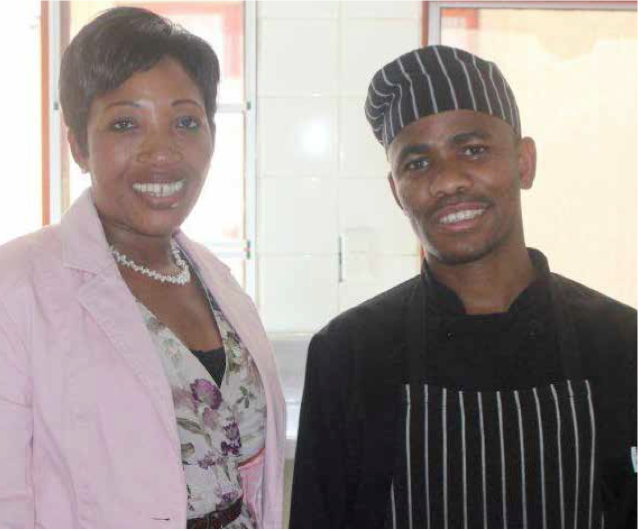 Now in its sixth year, the awards recognise, honour and reward small business owners for showing originality and tenacity in making their dreams come true. The BIC is part of the Eskom Development Foundation’s on-going Corporate Social Investment (CSI) enterprise development programme.
Now in its sixth year, the awards recognise, honour and reward small business owners for showing originality and tenacity in making their dreams come true. The BIC is part of the Eskom Development Foundation’s on-going Corporate Social Investment (CSI) enterprise development programme.
According to the foundation's CEO Haylene Liberty, South Africa has one of the lowest numbers of entrepreneurs among its population compared to other developing countries. “Our research also shows that about 73% of all workers are employed by small enterprises - this shows us that small business has the ability to create jobs.”
The BIC competition, which aims to create opportunities for growth, was open to small and medium-sized black-owned enterprises in South Africa.
The competition’s overall winner, Pyramid Electrical Contractors, received R200 000.
Started as a small entity by the husband and wife team of Ganief and Kariema Price in 1999, the business now has a staff complement of 14 and five vehicles, operating from its own premises in Landsdowne.
They specialise in cable tracing, cable fault location as well as repairs to underground electrical cables. They also offer low-voltage network reticulation and general electrical maintenance.
Skills development is a big priority at Pyramid and staff are offered regular in–house training and learnership programmes. This quality workmanship and skills development is what impressed the judges of the competition.
“Entrepreneurial development drives our economy; and competitions like this inspire new entrepreneurs,” said Ganief.
Sixty finalists in the manufacturing, trade and service or agriculture sectors also received R10 000 each to help grow their businesses. All finalists and winners were also given the chance to exhibit at the Business Opportunities & Franchise Expo held in Johannesburg in September. The expo allowed business owners to build brand awareness and interact with potential customers and investors.
Vuk’uzenzele caught up with two of the competition’s finalists to find out about their businesses.
Thapelo Motsage of Bongle Tota Trading Enterprise - Manufacturing category
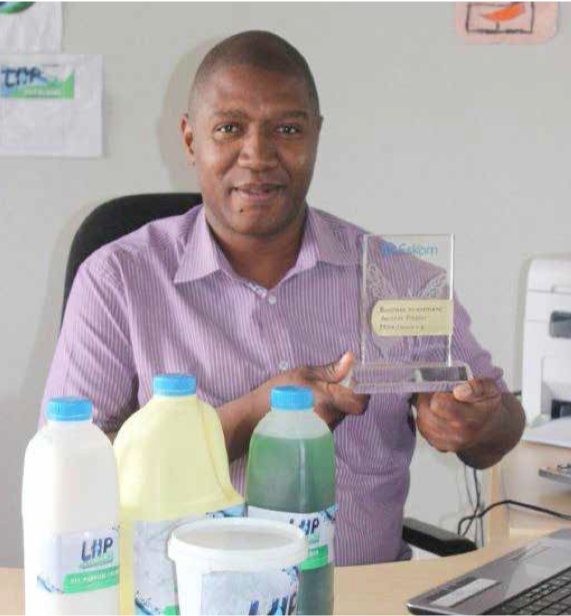 For owner and operator of Tota Trading Enterprise Thapelo Motsage, running his own business was a distant dream, until he ran an errand for his wife one day and an idea sprang to mind.
For owner and operator of Tota Trading Enterprise Thapelo Motsage, running his own business was a distant dream, until he ran an errand for his wife one day and an idea sprang to mind.
“I had to buy cleaning detergents for our home and after seeing the various brands, options and prices, it struck me that people had to go into town to buy products and I realised that I could supply and make my own products,” recalls Motsage.
Entrepreneurship was always a hidden passion for this Kimberley-born businessman and after working as a public servant for many years, first in the provincial treasury, then at the Gambling Board before joining the Expanded Public Works Programme (EPWP), his passion began to surface.
“During my involvement with the EPWP projects, I helped many a cooperative start up and develop and I realised I could also excel in this field.”
In 2009, Motsage started up Bongle Tota Trading Enterprise to supply cleaning products such as liquids and detergents to his community of Galeshewe at wholesale prices.
People no longer had to go into town to buy from the leading retailers. Motsage provided an affordable service closer to home that saved his community time and money.
Despite the great idea, it was very difficult to get communities used to different and cheaper brands, says Motsage. “People are extremely brand conscious and loyal to particular brands. I had to get them to try new products and once they saw for themselves how great they worked, only then were they convinced and started to support me.”
Motsage then began approaching local organisations and companies to buy cleaning products from him and today he supplies various hospitals, schools, clinics and a correctional service facility in Kimberley.
After receiving assistance from the Small Enterprise Development Agency (Seda) and the Department of Trade and Industry (dti), Motsage received funding of R290 000 from the De Beers group, which he used to fund his new venture - making his own brand of cleaning products - Lethabo Hygiene Products. He used the money to buy machinery and to kickstart his operations. He now employs 14 people full-time to manufacture products and provide cleaning services to his clients.
“My aim is to be a leading cleaning company in the Northern Cape that will provide one-stop cleaning solutions,” says Motsage. To date he has developed and packaged six products, dishwashing liquid, all-purpose pine gel, bleach, window cleaner and fabric softener.
He also offers cleaning services for offices, shopping centres, schools, guesthouses and hotels. His services include window cleaning and gardening.
Motsage also has a cleaning contract with one of the educational training colleges that will form part of the new Sol Plaatje University, currently being built in the Northern Cape.
Motsage was elated when his business made it to the finals of the Eskom BIC awards recently. “A lot of hard work and sweat goes into sustaining and growing a business. It is not for everyone, but if you have the passion and are willing to take risks, they will eventually pay off.”
Repa Guesthouse - Trade and services category
The decision to leave a stable job to pursue her passion for serving others came with its fair share of challenges, but for Neiso Mophule of Hillcrest, Kimberley, it was a decision she would never regret.
Mophule, who had worked in human re- sources management for 10 years, decided in 2005 to quit her job, and together with her husband Chris, a pharmacist, decided to invest their savings and open a guesthouse in the area. The idea came to the Mophules after they were approached by a friend to host a delegation of 10 people for a few days.
“There was a shortage of guesthouses in the area, and so we agreed to open up our home and out-house to host the delegation. I woke up early, cooked for the guests and prepared their rooms and realised I loved every second of it,” says Neiso.
“At the time there weren’t many black-owned upmarket, reputable guesthouses in the area, so this was a great niche market to tap into,” explains Neiso.
The couple soon found the perfect spot in a gated community in Kimberley and began building the perfect guesthouse named Repa, which means relax in Setswana.
Getting involved from beginning to end, Neiso wanted the house to feel modern, so guests could feel at home, but experience a leisurely stay at the same time. The two then applied for funding from the dti and received close to R700 000.
They have 17 rooms, four self-catering units, a conference centre, a shuttle service and employ 10 full-time staff, including skilled chef Wandile Mabala.
“Repa has changed my life, and I am able to interact with and meet people from all over the world. The greatest part is they love my oxtail recipe, so it keeps guests coming back for more,” says Mabala.
The duo has achieved great success and scooped many awards, like the Emerging Tourism Entrepreneur of the Year in 2009 and a Tourism Service Excellence award in 2010.
They have also been invited to attend and exhibit at various tourism indabas both locally and internationally, and most recently scooped the finalist award for Trade and Services in the Eskom BIC competition.
“The thing that defines a great business in the service industry is our ability as South Africans to incorporate our culture into what we do. We are known as the most hospitable country in the world and we embrace that every day,” says Neiso.
For financial assistance from the dti visit www.dti.gov.za or call 0860 843 384.
For more information on the Eskom Business Investment Competition contact 011 544 1900 or email bic@groundedmedia.co.za.
Trash to treasure: making jewellery from recycled bottles
Trash to treasure: making jewellery from recycled bottles sadminSeven women from KwaNyuswa in Durban, KwaZulu-Natal, are turning beer and cool drink bottles into jewellery, making good money in the process.
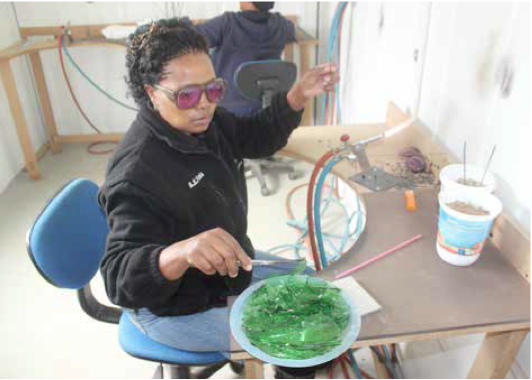 The group call themselves the Simunye Hand Craft and Jewellery makers.
The group call themselves the Simunye Hand Craft and Jewellery makers.
Simunye makes earrings, bracelets, and necklaces along with serving trays,
salad spoons, forks, bookmarks and corkscrews decorated with melted glass. Some of the items are sold as corporate gifts. Simunye has also signed an agreement with businesswoman Khanyi Dhlomo Mkhize to supply goods to her upmarket boutique.
After struggling to find employment, members of the group came together in 2004 and started making traditional beadwork. Soon thereafter, they asked the eThekwini Municipality to help them with training as they wanted to grow the business.
“When the municipality came on board in 2010, they introduced us to the process of manufacturing glass beads,” recalls chairperson of the cooperative, Angel Hlongwane.
She adds that for 12 months the municipality helped them with procuring equipment and contracted a company called Mintek to provide training and mentorship for the group.
The group also received a R500 000 grant from the KwaZulu-Natal Department of Arts and Culture which helped boost the business further.
The women work from a container where they store the bottles and gas used to melt the glass and make the goods.
A typical day at Simunye starts with collecting green, brown and transparent glass bottles around the community.
“We clean the material then break it into little pieces and melt it using a torch infiltrated with gas. Once this is done we form different de- signs depending on the customer’s preference. “The glass is cooled in a blanket for about three hours before it is cleaned with water and turned into jewellery.”
The cooperative has exhibited its work at expos in the country and around the world.
Hlongwane says they have attended expos such as the Durban Business Fair, Sustainable Living Expo, Jewelex as well as expos in China and America with the assistance of the Department of Trade and Industry (dti).
“It's great that the dti also assists us in marketing our business. Even if nobody buys our goods when travelling but they always call us back to place orders. It’s very good marketing.”
MEC of Tourism and Economic Development in KwaZulu-Natal Mike Mabuyakhulu has said the province aims to become the powerhouse of arts, craft and tourism in the country and in the region.
Speaking at the KwaZulu-Natal Arts and Craft Conference in December last year, MEC Mabuyakhulu said the craft sector is as old as the cultures of the people from which it originates hence it’s often referred to as the cultural industry.
“The sector has become a serious contributor to the global economy hence arts and craft can no longer be treated like a hobby for artists and crafters to pass time and satisfy their desires or express their feelings about life as they see it around them.”He said the arts and crafts were becoming big business that was contributing to Gross Domestic Product (GDP) of different countries around the world.
MEC Mabuyakhulu said this called for serious investment to the industry.
“In Morocco, the craft industry contributes 15% of GDP while in South Africa we are languishing at 0.14% that translates to only R32 billion and is a source of income for 273 495 people employed in 31 802 small businesses.” Hlongwane would like to pass on her unique combination of recycling and craftsmanship. “Moving forward we would like to teach our community about the importance of recycling and teach young people this skill that we have.”
Village women craft their way up the tourism market
Village women craft their way up the tourism market sadminAt the foot of the majestic Drakensberg mountain range in the Mazizini village near Bergville, KwaZulu-Natal, a group of women can be seen peddling handmade traditional artworks to tourists who frequent the area – a natural spectacle which has been declared a World Heritage Site.
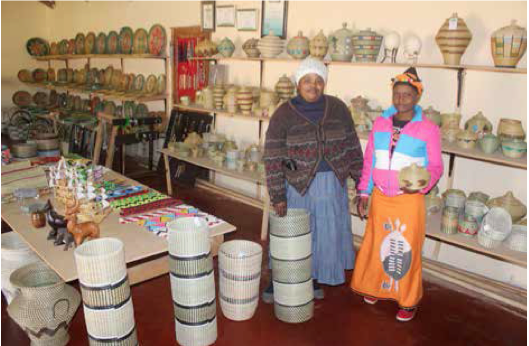 The women are members of Thandanani Crafters, an award-winning co- operative that makes and sells picnic baskets, umbrella stands, laundry baskets, jewellery baskets, beadwork and a variety of mats. For tourists who frequent the area, these are valuable souvenirs – rich in memories of their South African trip.
The women are members of Thandanani Crafters, an award-winning co- operative that makes and sells picnic baskets, umbrella stands, laundry baskets, jewellery baskets, beadwork and a variety of mats. For tourists who frequent the area, these are valuable souvenirs – rich in memories of their South African trip.
Beauty Mbongwa, manager of the 48-member Thandanani Crafters Cooperative, says their little craft centre now forms part of the tourist attractions of the area. Members generate a steady income and with help from the Department of Trade and Industry (dti), they have exhibited their products overseas. Their biggest client is a Cape Town-based buyer who places sizeable orders every month for clients abroad.
Mbongwa says she learned her traditional craft from her grandmother at Mazizini and she’s grateful that she can now make a living from it. She says the past 20 years have been good for business but things were hard in the beginning.
Mbongwa recalls the early days when the women sold their artworks individually, and in the open. “In the early 1990s we used to make our traditional artwork and sell to people on the streets. You would find that some- times it would rain and our goods would get damaged.” Things changed in 1993 when local businessmen clubbed together to build shelter for the women to sell from. In 1994, the women moved into the new structure and stock loss was drastically reduced. This improved their working conditions and increased their turnover, says Mbongwa.
“For most of my life I did not work. With this money, I have been able to build a house. My son is also a chef at a leading hotel. I put him through school because of our craft. The tourism sector really does wonders for our business.”
Mbongwa says at first they were not sure how they could use their craft to benefit from the thriving tourism sector and help develop their community. The women experienced a turning point after formally registering their business.
“In 2005 we decided to formalise our bus ness and officially registered it with Cipro. This really helped us because from 2007, we were able to travel to the United Kingdom, Iceland and Italy to market our products and the country through the dti and the Dube Trade Port.”
The Thandanani Crafters Cooperative has won awards such as the Department of Economic Development’s best managed cooperative in 2009 and was also placed third in the African SMME Awards in 2011.
Mbongwa says even though the business is now thriving, they still needed training to cope with the large orders they are getting.
When KwaZulu-Natal MEC for Tourism and Economic Development Mike Mabuyakhulu delivered his Budget Vote this year, he said tourism in the province was a source of employment and livelihood to a number of families and provided the province with foreign currency.
Tourism remains an important economic sector in KwaZulu-Natal, contributing about 10% directly and indirectly to the province’s GDP, he added.
MEC Mabuyakhulu's department has developed a Provincial Tourism Master Plan to coordinate tourism planning, development and management across the province. The plan is aligned to the Provincial Growth and Development Strategy that sets targets up to 2030.
“The plan provides for a scope to set targets that are measured to gauge tourism growth in all tourism related sub-sectors. These targets include a R65.2 billion contribution to the GDP, 183 820 direct jobs to be created by 2020, increase the number of domestic arrivals to 24, 17 million by 2030 – which is a significant leap of almost 50% from current figures.”
The targets set in the master plan are also aligned to the National Tourism Sector Strategy. One of the iconic tourism projects identified in the plan is the Drakensberg Cable Car, which is set to change the tourism landscape in the province.
“We are in the process of appointing a service provider to develop a feasibility study and a business plan for the Drakensberg Cable Car and we are confident that this additional landmark to our list of tourism products would have unparalleled spin-offs,” said Mabuyakhulu.
Indeed, the Thandanani Crafters Cooperative looks set to ride on the back of this surge in tourism to KwaZulu-Natal.
Former teacher a class act in farming
Former teacher a class act in farming sadminWhen Kenalemang Kgoroeadira swapped chalk and duster for a pick and shovel to start a farming project, she had no clue that she would one day be crowned the Best Subsistence Farmer of the Year.
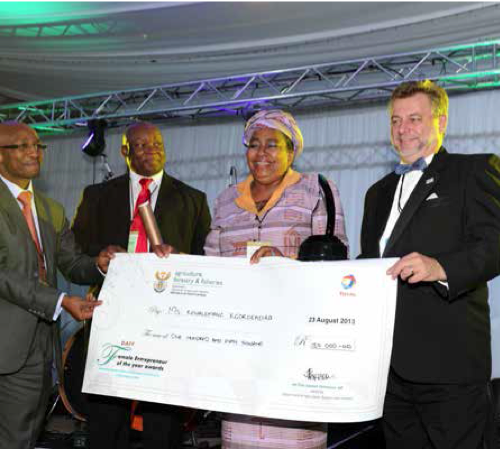 Kgoroeadira had been a teacher for 19 years, from 1978 to 1997, before leaving her post to become a farmer.
Kgoroeadira had been a teacher for 19 years, from 1978 to 1997, before leaving her post to become a farmer.
“I’m still doing teaching even now. I still teach the people I work with on the farm,” she says, referring to the employees she mentors.
Kgoroeadira’s Thojane Organic Farming entered the Department of Agriculture, Forestry and Fisheries’s Female Entrepreneur of the Year Awards for the first time when she won the Best Subsistence Farmer of the Year award. She says she will use her R150 000 prize money to buy much-needed equipment for the farm.
The Best Subsistence Farmer category caters for beginners in the sector, who are expected to demonstrate innovation in improving production, responsible use of production inputs, understanding of improved farming methods, job creation and economic development.
Kgoroeadira employs three women and two youths permanently, and sells her produce at the local schools’ feeding schemes and supermarkets. Another five people are employed seasonally.
“Currently we supply school feeding schemes in the Bafokeng schools and the Foro Spar in Tlhabane,” she says.
Unlike traditional farming methods, organic farming does not use any chemicals and is a form of farming that relies on techniques such as crop rotation, green manure, compost and biological pest control.
‘Mamakena’ as Kgoroeadira is affectionately known, started Thojane Organic Farming in Phokeng, outside Rustenburg, in 2009. The two-hectare plot produces a variety of vegetables, including potatoes, butternut, green beans, spinach, carrots and cabbage.
The farm also produces herbs such as rose geranium, rosemary, thyme, lemon verbena, lemon grass, yarrow, mint, garlic, parsley and lavender.
MEC for the North West Department of Agriculture and Rural Development Desbo Mohono said Thojane Organic Farming’s desire and passion to positively contribute towards household food security, healthy lifestyles, job creation and economic development deserved recognition and encouragement.
MEC Mohono further committed that her department would continue to work with other stakeholders to ensure that women managed projects are supported and guided to produce quality and nutritious products.
Tshwaraganang Barolong: Teach a woman, feed a village
Tshwaraganang Barolong: Teach a woman, feed a village sadminIn 2000, Mapule Lebakaeng returned to her home village of Motsitlane in North West, ready to use the skills she had acquired in Johannesburg to uplift her community.
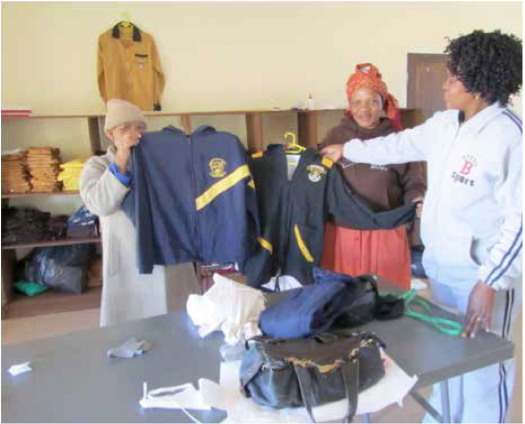 She had been away for 15 years, during which she had learnt how to knit, sew, as well as make soup, juice and cleaning products.
She had been away for 15 years, during which she had learnt how to knit, sew, as well as make soup, juice and cleaning products.
She had learned how to knit at the Peace Knitting School and went on to teach others. Then she worked briefly for the Watts household in Jeppestown, where she learned the art of turning chemicals into soap, bubble bath or dishwasher.
Shortly after her return in 2001 – and encouraged by Annah Phoi, the wife of the local chief - Lebakaeng brought together 112 village women and used her machine and her home to teach them knitting and sewing, while manufacturing uniforms for local schools. The women each contributed R2 per month to keep the business, now known as Tshwaraganang Barolong, going.
Some of the women used their newly-acquired skills to find jobs and others went on to open their own businesses. “We teach them and they become employable or get their own customers,” says Lebakaeng.
But in 2003, the then Department of Provincial and Local Government (DPLG) built new premises for the women, getting them ready to play in the big league. The DPLG built them an imposing nine-room structure which has a kitchen, sewing room, knitting room, store room, chemical room and two toilets.
In 2006, the women received a grant from the National Development Agency (NDA), which they used to buy a bakkie, an industrial machine, two overlocking machines, an embroidery machine, fridge, and the raw materials needed for sewing, cleaning and knitting.
At the same time, the Department of Labour and the NDA provided them with lessons in financial management, financial planning, sales and marketing over two years.
“We are proud to be associated with Tshwaraganang Barolong,” says Potlako Ntlatleng, NDA North West Provincial Manager. “This is an example of local economic development at its best. The project has created a sizeable number of beneficiaries and a lot of indirect beneficiaries.
“It is also saving locals money by making goods such as juice, polish, uniforms, etc available locally resulting in a saving for community members who would have had to go far to access these goods.”
Liver Mpaketsane, Development Manager of the NDA in North West, said since 2012, the NDA had financed 17 community development projects with R13 million. “These projects are catalysts for rural women empowerment. The resilience of these women against all odds will surely pay off if, as government we amplify their services.”
Today, Tshwaraganang is a major supplier of uniforms to local schools and churches, as well as cleaning detergents, soup, ice cream and juice to the village. The remaining 10 members are inundated with business, and those who were trained and left are doing well on their own.
For her part, Lebakaeng is a migrant worker who revived the economic life of a sleepy village.
President Zuma pays tribute to young pioneers
President Zuma pays tribute to young pioneers sadminYouth matters
Young people should play a leading role in the implementation of the National Development Plan (NDP) as the future of the country lies with them.
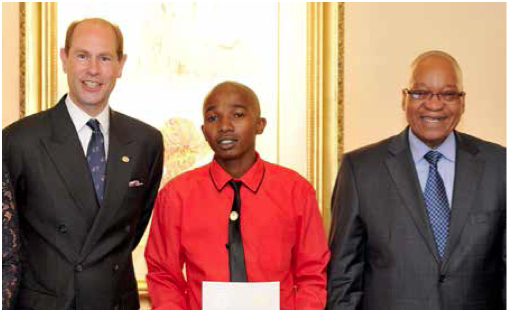 This was said by President Jacob Zuma at the President's Awards for Youth Empowerment ceremony in Cape Town recently. “We want the youth to own the NDP and to be part of its implementation, as it is designed to make this country a better place for them.”
This was said by President Jacob Zuma at the President's Awards for Youth Empowerment ceremony in Cape Town recently. “We want the youth to own the NDP and to be part of its implementation, as it is designed to make this country a better place for them.”
Now in its 30th year, the President’s Award for Youth Empowerment is an international initiative to recognise young people between the ages of 14 and 25 who have made a positive contribution in their communities.
Some 119 young people received their Gold Award from President Zuma and the Earl and Countess of Wessex, Prince Edward and Princess Sophie. The recipients included 13 inmates, 39 from community youth groups and 68 from schools in the Western Cape.
The programme is based on four pillars: skills development, physical recreation, com- munity service and the adventurous journey. President Jacob Zuma said it was encouraging that there were projects involving young people that were initiated through the President’s Award Programme.
“I am encouraged to hear about the joint collaborative projects that these young people are involved in through the President’s Award Programme.
“I was encouraged to learn that, as part of the President’s Award for Youth Empowerment’s 30th anniversary year, three regional Youth Dialogue and Action workshops were held with the support of the National Youth Development Agency, the Department of Arts and Culture and Brand South Africa.” The workshops involved discussions about the NDP which was launched last year and how young people could help realise the Plan’s Vision 2030. In addition to the discussions, participants from across the country were involved in different projects.
Participants from the Eastern Cape were involved in a pre-school literacy project, Western Cape participants in a clothing project, while participants from Gauteng and Mpumalanga refurbished a school for the needy. President Jacob Zuma applauded the participants saying their participation showed active citizenship.
Summit brings young leaders and their vision to Jhb
Summit brings young leaders and their vision to Jhb sadminYouth matters
More than 1 300 young ambassadors from 190 countries descended on Johannesburg last month, as South Africa played host to the One Young World (OYW) Summit. Founded in 2009, the summit rallies together young people from around the world, inspiring them and establishing lasting connections to create positive change in their communities.
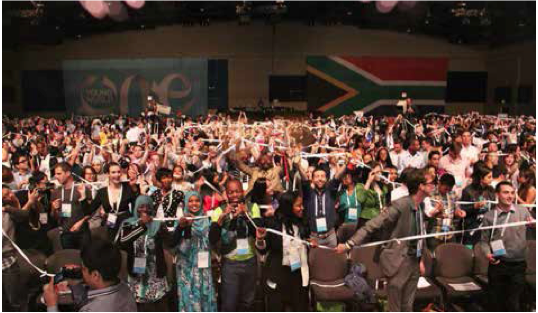 Addressing challenges such as health, education, HIV and Aids, agriculture and environmental issues, the summit allowed the youngsters to voice their concerns and share insights and wisdom on these global challenges.
Addressing challenges such as health, education, HIV and Aids, agriculture and environmental issues, the summit allowed the youngsters to voice their concerns and share insights and wisdom on these global challenges.
This year’s summit was graced by former United Nations Secretary-General Kofi Annan and celebrity chef Jamie Olive. Global entrepreneur Sir Richard Branson made his first appearance as a OYW counsellor.
Branson, an icon of entrepreneurial success, called on youth to explore how to mobilise corporate resources for social benefit and to address social and environmental problems in an entrepreneurial way, while chef Jamie Oliver hosted a panel discussion on the Food Revolution, his United States based television show and a movement to fight obesity and get Americans to eat more healthily.
Sport icons such as tennis legend Boris Becker, rugby players Francois Pienaar and Ashwin Willemse and Olympic swimmer Ryk Neethling also stepped forward to discuss sport and society, highlighting the power of sport to influence positive change.
The annual One Young World Summit, held in South Africa for the first time, raised questions about the international challenge of youth unemployment.
Executive Mayor of Johannesburg Parks Tau said the summit was an ideal platform for driving change and development.
“We hope to do this for education in Johannesburg, as education is key to the future of our youth.” He described Johannesburg as an exceptionally youthful city with half the city’s population under the age of 34.
“This has the potential to create a very dynamic and vibrant society with a strong emphasis on innovation, enterprise and creativity. We firmly believe in planning with people – not for them. The youth of our city is a critical constituency, and we are constantly refining our efforts to engage them in planning processes.”
Ambassadors of change
For Secunda-based Lwazi Mqadi, being an ambassador was a great accomplishment. This change leader, who believes in finding solutions to challenges in her community, was chosen from thousands of applicants by Sasol to attend the Summit. “I believe that everyone is a star, and just like a star, which continually generates heat and light energy for other universal bodies to be lit up, everyone has infinite potential in them to be just as great and successful.
“Everyone can make a difference and be a source of other people’s well-being and fulfilment. People just need a platform to discover their potential. I am passionate about providing this platform,” says Mqadi.
Her passion for education led her to start the Nyeleti Saturday School initiative. Along with friends, she provides mathematics, science and English extra classes for learners from local schools.
Still not satisfied, she started a pre-school in the Holfontein Informal Settlement to cater for children whose families could not afford to send them to school. The pre-school is registered with Accelerated Christian Education (ACE) Ministries, and ACE is currently training unemployed members of the community as teachers. Mqadi also led a fundraising project to build an orphanage for the Umphumela Drop-In Centre. With the assistance of Sasol, she raised R140 000 for the project.
Another South African ambassador was KwaZulu-Natal born Crispian Lees. Motivated, innovative and personable, Lees says his passion lies in improving education and water quality in South Africa.
After matriculating in 2005, Lees worked as an instructor at Spirit of Adventure in Shongweni, an outdoor leadership centre in KwaZulu-Natal. This opportunity allowed him to work with schools in developing teamwork and leadership skills programmes. The work was instrumental in bridging cultural divides and building character and relationships within the teams.
In 2007, Lees began his studies in chemical engineering. “I couldn't help but notice the shortage of skilled maths and science teachers in our country, as well as the growing knowledge gap between high school and university,” he says. With this in mind, he co-founded an educational organisation called Advantage Maths that provides Advanced Programme Mathematics courses to schools. He currently tutors mathematics and science to Grade 11 and 12 learners from underprivileged schools in the Sasolburg area through the Fundani Nathi training and outreach programme.
Another delegate Emmanuel Jal was a Sudanese child solider, who now calls himself a peace soldier, using music and activism to spread a different message.
Jal, who spoke at the summit, says education changed his life. "Education helped me on a very personal level," says Jal, recalling the ethno-religious tensions that often fuelled conflict between the north and the south in Sudan.
"Back then I hated Muslims and Arabs,” he recalls, saying he had been led to believe they were the cause of the conflict in southern Sudan.
"Education is what helped me understand the political situations and how economics affects the world. I realised that human beings are the same.”
Today he is an internationally recognised musician and humanitarian who believes in the vision of education, dialogue and youth mentorship as a path towards fostering peace and empowerment, especially in situations of poverty and war across Africa.
"Africa is the way it is because of most African people not taking the steps to move forward. At the One Young World Summit I have seen a lot of young African leaders taking the lead from the grassroots up, and that is the light, that is the hope."
For South African ambassador Aslam Levy, attending the One Young World Summit was an exceptional honour. Two sentiments from the summit have resonated with the 30-year-old social media director at the Government Communication and Information System (GCIS). The first was introduced by Kofi Annan, as he encouraged delegates to “think globally, and act locally”.
“This statement enforces that the issues we face today are of a global nature and that we must tackle them together.” The second quote which hit home, says Levy, is “if you want to go fast go alone, but if you want to go far, go together”.
Levy, together with three close friends, co- founded the Inspirational Women International Foundation. This non-profit organisation helps improve and uplift the lives of young women and girls through various community programmes across the country. Through motivational talks and first-hand experiences shared by inspirational women around the globe, the foundation is able to break the barriers that prevent young women from realising their true potential.
The next One Young World Summit will be held in Dublin, Ireland from 15 to 19 October 2014.
Breaking barriers for people with disability
Breaking barriers for people with disability sadminDisability
The Department of Women, Children and People with Disabilities (DWCPD) is on a mission to break barriers that stand in the way of people with disabilities.
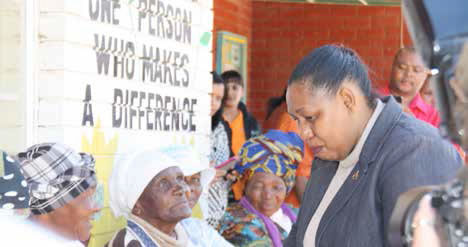 In line with the United Nations theme, ‘Break barriers and open doors for an inclusive society for all’, South Africa has gone a step further for this year’s International Day of People with Disabilities.
In line with the United Nations theme, ‘Break barriers and open doors for an inclusive society for all’, South Africa has gone a step further for this year’s International Day of People with Disabilities.
South Africa has introduced five focus areas under the international theme to mark the occasion on 3 December. The five areas are access to public transport, promoting sign language, improving access to braille material, promoting the use of right terminology and increasing access to and sensitivity at places of worship.
Deputy Minister of Women, Children and People with Disabilities Hendrietta Bogopane-Zulu says the department, launched by President Jacob Zuma in May 2009, is responsible for promoting equal opportunities and access to these opportunities for women, children and people with disabilities.
Deputy Minister Bogopane-Zulu says her pet projects are disability, anti-poverty and HIV and Aids relating to women and children, and persons with disabilities.
“For me disability hits home, it is personal. Being visually impaired and raising two children that are visually impaired as well, makes disability my first passion. As a mother, and as a public servant, I want to create better services, opportunities and a better life for people like myself and my children - being able to do that is me at my best.”
Breaking barriers in SA
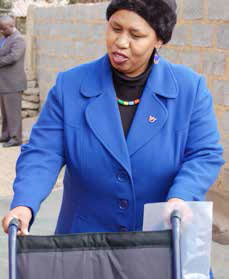 One of the barriers the department wants to overcome is to improve the access of people with disabilities to public transport. Despite certain buses and trains being equipped with disability friendly features, most of the public transport in the country is still inaccessible for someone in a wheelchair.
One of the barriers the department wants to overcome is to improve the access of people with disabilities to public transport. Despite certain buses and trains being equipped with disability friendly features, most of the public transport in the country is still inaccessible for someone in a wheelchair.
“What is the point of creating jobs for people with disabilities if they cannot take a bus or taxi to work?”
The Deputy Minister says the department is currently working with the Department of Transport to revamp transport infrastructure and the current transport system to make it more accessible for people with disabilities.
To overcome the language barrier facing deaf people, the department is working with other departments to introduce sign language as the twelfth official language in the country. It will also be the first official language for deaf learners or those with hearing disabilities.
Another major achievement is the introduction of sign language as a subject at school. Come January 2014, all learners at mainstream and special schools across the country will be able to take sign language as a subject.
In an attempt to improve access to braille material for persons who are blind or visually impaired, South Africa enforced the Marrakesh Treaty which was signed by 51 countries in June this year. The treaty allows for copy- righted books to be reproduced in braille.
The treaty makes it legal to send braille books across national borders. For example, with South Africa approving the treaty, blind people in the country will be able to access books from the United States.
“We need to break the barriers of terminology and how we refer to people with disabilities, and those who suffer from albinism.”
Albinism is an inherited condition that affects a person’s pigmentation. This means that a person is unable to produce normal colouring of the skin, hair and eyes.
There are many challenges facing those who suffer from albinism or disabilities - like being treated as an outcast.
To address these challenges, the department will soon host the first ever conference for people with albinism, together with linguists, traditional healers, and government and com- munity leaders.
“As a nation it is about time that we join forces and talk about issues and the realities persons with albinism face. We need severe introspection on how we treat people with albinism in the country,” she stressed.
Place of worship
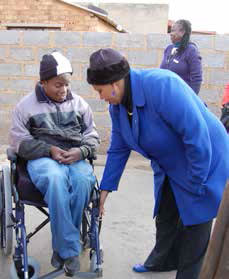 The focus is also on access to places of worship and religion. If you stop and look at the designs of a church for example, she says, a person in a wheelchair cannot sit in a pew or go up to the altar to receive communion. Instead they have to worship from the middle of the aisle or from the back of the church.
The focus is also on access to places of worship and religion. If you stop and look at the designs of a church for example, she says, a person in a wheelchair cannot sit in a pew or go up to the altar to receive communion. Instead they have to worship from the middle of the aisle or from the back of the church.
“We need to tackle and improve infrastructure across all places of worship from churches, to temples and mosques.”
The last barrier affecting the dignity of a person with disabilities is the interpretation of the scriptures. “In many communities, disabled persons are portrayed as objects to reaffirm faith. If someone has been in a car accident and ended up in a wheelchair, certain religious leaders use this as a façade to pray for them so they will stand up. These kinds of things are disrespectful and perpetuate disability discrimination. It creates a barrier for someone who just wants to be a spiritual person,” she adds.
The fruits of freedom
Deputy Minister Bogopane-Zulu expresses satisfaction that the advent of democracy has improved the lives of people with disabilities but admits that more needs to be done.
“The major impact we have made as government is restoring dignity to the lives of our people. Previously, people with disabilities were looked down upon and as burdens on society. I was a rural, black, disabled woman. I was less of a human because I was black, added on top that I was a woman, and to top it off I was disabled - I was invisible in society, but today people like me have a chance at a better life.”
The Deputy Minister says government has improved access to education for people with disabilities.
Previously, only white disabled children were allowed to go to school. Now, thanks to inclusive education and the introduction of special schools across the country, a disabled child can go to any school he or she wants to.
“As a parent you can now choose which school you would want your child to attend, be it a mainstream or a special school. A principal has no right to deny a child access to education and if a school is not accessible to your child, that is not your problem, it is government’s problem to make sure your child is able to learn.”
She adds that with the establishment of the Higher and Further Education Disability Services Association (HEDSA) last year, more disabled students are now going to tertiary institutions and Further Education and Training colleges.
HEDSA is a non-profit organisation that represents and assists disability services at higher and further education institutions in the country.
To further increase the number of disabled graduates, the National Student Financial Aid Scheme (NSFAS) revised its guidelines to en- able disadvantaged and disabled learners to access funding. NSFAS also gives disabled learners access to assistive and technical de- vices should they need them, which was never possible before.
The Department of Social Development also introduced a disability grant, and should you acquire a disability, government now makes provision for an additional grant that will en- able you to make your house accessible, says Deputy Minister Bogopane-Zulu. “This is an additional grant, a benefit we have never had before.”
Previously parents of disabled children had to carry disability costs on their own, but thanks to government interventions, parents get every disability related expense paid back to them, when they submit their tax returns.
Disability Month will kick off in Northern Cape on 3 November, with a multi-faith dialogue between religious leaders and persons with disabilities. “We are trying to identify barriers and pave the way forward for people with disabilities,” she said.
For more information contact the Department of Women, Children and People with Disabilities on 012 359 0000.
Govt to speed up BEE impact
Govt to speed up BEE impact sadminFollowing a summit held recently on Broad Based Black Economic Empowerment (BBBEE), government is to move swiftly to make sure that economic empowerment benefits a broader spectrum of black South Africans.
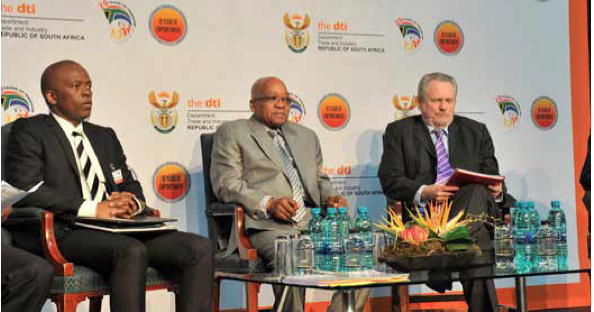 Companies will be required to from next year help transform and build the economy by supporting and buying from black suppliers. This is in line with the gazetting of the amended BEE codes of good practices last month, which are set to come into force in October next year after a one-year transition period.
Companies will be required to from next year help transform and build the economy by supporting and buying from black suppliers. This is in line with the gazetting of the amended BEE codes of good practices last month, which are set to come into force in October next year after a one-year transition period.
Those firms that fail to achieve a minimum number of BEE points procuring from and helping black enterprises also risk having their BEE score downgraded.
The Department of Trade and Industry (dti) is now meeting with various companies to explain the significance of the new codes. “We want SA inc to really embrace this and come on board,” said Nomonde Mesatywa, the department’s chief director of BEE.
She said the BEE summit held in Midrand in October, which was opened by President Jacob Zuma, saw over 1 000 delegates attend even though attendance had been capped at 700. Those attending included corporates, small businesses (including those that exhibited at the summit), policy makers and BEE consult- ants and those at verification agencies. “I think people were positive, they were applauding the new direction (of BEE),” said Mesatywa of the reaction by delegates at the conference.
The battle against fronting
The new codes are also designed to stamp out fronting. Dti Minister Rob Davies said fronting was one of the practices that had set BEE back. “We found that there was significant fronting in the economy.” Through fronting, some companies had essentially not been entirely truthful in their dealings.
Minister Davies said there were a lot of complex transactions where companies were not entirely truthful with their credentials in relation to BEE compliance so as to derive benefits such as clinching tenders.
This was a form of fraud, Minister Davies said.
Slow progress
In his speech at the BEE summit, President Zuma said though the appointment of black people and women to senior management positions in the private sector has increased from less than 10% in the 1990s to over 40% today, the country has yet to see the growth of black industrialists despite government’s aggressive focus on boosting the manufacturing sector.
“The day we see factories all over the country owned by black entrepreneurs taking advantage of our Industrial Policy Action Plan, we will be moving towards achieving our BBBEE goals,” he told delegates. He said the new BEE codes would ensure that both public and private sectors procure a certain percentage of goods and services from local black-owned and controlled entities.
While the Cabinet is tackling late payments to small enterprises through a special project run by the Department of Performance Monitoring and Evaluation and the National Treasury, President Zuma also highlighted the support that government had given black businesses, including:
• The approval since September 2010 of 2 128 applications to the value of R797 million through the Department of Trade and Industry’s Black Business Supplier Development Programme, which helps to fund equipment and improvement in management practices for black-owned firms.
• The approval of over 500 transactions worth over R5 billion to black-empowered businesses by the National Empowerment Fund (NEF). To date the NEF has supported in excess of 44 000 jobs.
Over 200 cooperatives were supported through the Co-operative Incentive Scheme, creating over 2 700 job opportunities, in the past year. In all 100 small-scale cooperatives offering around 500 new job opportunities were established, and more than a 100 cooperatives were assisted to enhance their market access through local and international exhibitions.
10 years of BEE
This year marks a decade of the existence of BEE. Dti Director-General Lionel October said it was time to critically assess progress made since the implementation of the legislation.
The President said that throughout the decade, there had been successes and challenges in the implementation of the legislation, and that the summit was intended to reflect on what has worked and what has not, so as to build a truly inclusive economy.
The South African economy had expanded by 83 % over the years, with total employment having increased by more than 3.5 million since 1994.
President Zuma noted that there had been growth in the black middle class. He said al- though progress had been achieved with BEE, the country still faced unacceptable levels of poverty, inequality and unemployment.
But he expressed concern that the income earned by different races remained unequal.
Progress made in terms of BEE transactions, according to National Treasury, was that over R600 billion in BEE transactions had been recorded since 1995. The National Empowerment Fund (NEF), which is mandated to grow black economic participation, has approved over 500 transactions worth over R5 billion to black empowered businesses across the country.
However, there was a need to bridge the gap between the rich and the working class. The average African household income is R60 613 and the annual income of the average white household is R365 164. There were still unacceptably high levels of poverty, inequality and unemployment.
President Zuma encouraged the growth of SMMEs that are owned by black people, women, youths and people with disabilities.
Rea Vaya spurs local manufacturing
Rea Vaya spurs local manufacturing sadminBuses for the Rea Vaya Bus Rapid Transit System (BRT) in the City of Johannesburg are now manufactured locally, creating much-needed jobs.
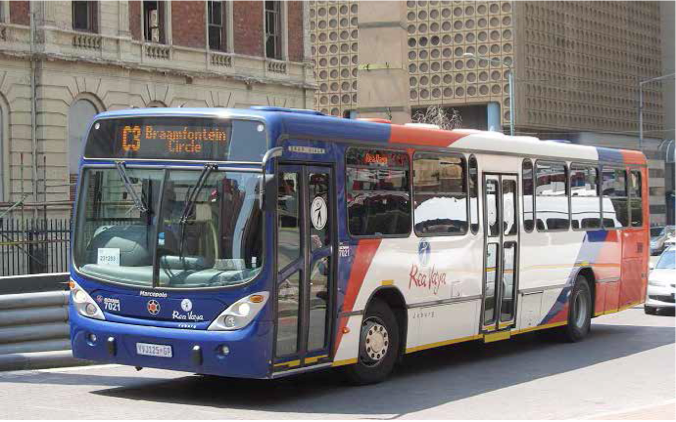 Johannesburg Mayor Parks Tau announced this at the launch of the new Rea Vaya Phase 1B route which runs from Noordgesig in Soweto to Ellis Park Stadium in Doornfontein. “During construction about 9 300 jobs were created and for each job that is created in construction, about another two are created elsewhere in South Africa in areas such as cement production,” said Mayor Tau. He added that the city had taken a deliberate decision to delay the procurement of buses to ensure that local content of buses could be maximised.
Johannesburg Mayor Parks Tau announced this at the launch of the new Rea Vaya Phase 1B route which runs from Noordgesig in Soweto to Ellis Park Stadium in Doornfontein. “During construction about 9 300 jobs were created and for each job that is created in construction, about another two are created elsewhere in South Africa in areas such as cement production,” said Mayor Tau. He added that the city had taken a deliberate decision to delay the procurement of buses to ensure that local content of buses could be maximised.
Under the theme of “Living in the corridors of freedom of a caring city”, the mayor launched the new route which takes commuters via some key public hospitals like Rahima Moosa, Helen Joseph and Charlotte Maxeke as well as private hospitals such as the Brenthurst and Park Lane Clinic.
It also goes pass educational institutions like the University of Johannesburg (Doornfontein, Bunting Road, Kingsway and Soweto campuses) Wits University, Milpark College, John Orr’s College, Parktown Boys High School, Randpark High School, Helpmekaar Hoërskool and the National School of the Arts.
The new Rea Vaya Phase 1B services will use 134 new buses. However, only 57 buses will be used at the start of operations.
Rea Vaya is South Africa’s first and leading Bus Rapid Transit system. It has grown immensely since it began operating in 2009.
Watch out with your year-end spending
Watch out with your year-end spending sadminHotline
With the festive season just around the corner, the National Credit Regulator (NCR) is urging consumers to spend their money wisely.
 December is no different from any other time of the year. Remember, you do not have more money to spend other than your monthly salary. Your bonus should be used to pay off debts and other expenditures,” says Louisa Hetisani, Manager: Credit Information and Research at the NCR.
December is no different from any other time of the year. Remember, you do not have more money to spend other than your monthly salary. Your bonus should be used to pay off debts and other expenditures,” says Louisa Hetisani, Manager: Credit Information and Research at the NCR.
Nomsa Motshegare, CEO of the NCR, encourages consumers to live within their means and to use credit responsibly.
In June this year, the NCR released the Credit Bureau Monitor (CBM) which showed that the number of credit-active consumers had increased by 0.6% from 20.08 million in the previous quarter to 20.21 million.
Consumers classified as being in good standing decreased by 31 000 to 10.52 million, a decrease of 0.5% quarter-on-quarter and 1.0% year-on-year. The number of consumers with bad records increased from 9.53 million to 9.69 million, an increase of 161 000 compared to the previous quarter.
Credit active consumers are consumers who have to pay credit providers or service providers. These obligations result in transactional entries on the consumer’s credit record at the credit bureaus.
The NCR advises consumers to spend wisely this year by following these simple steps:
- Do a budget for the festive season and include all debt, rent, electricity, water, insurance, transport, gifts, and entertainment.
- Be proactive and double your regular payments such as mortgage or rent, lights and water. That way you will be able to afford costs such as school fees and uniforms, which will hit you at the start of the New Year.
- Prioritise your home loan and rent.
- Shop around for cheaper options.
- Avoid unnecessary credit and the ‘buy now pay after three months’ adverts.
- If you do borrow money, make sure you borrow only for what is strictly necessary, and ensure that you can afford the repayments.
- Make it a family project to make presents for friends and relatives. Bake biscuits, draw a picture, write a poem or sew a cushion cover. These all cost much less than buying something in the shops and will mean more.
- If you’re not sure exactly how much you want to spend on each person’s present, it’s easy to get caught up in the moment and overspend. Limit yourself to an amount for each person to help keep track of your spending.
- Items such as school stationery, uniforms or other useful items are a better investment than plastic toys that don’t last. Choose presents that last long after Christmas.
- Instead of buying expensive presents, set up a savings fund and put away an amount for your loved ones each Christmas. Over time this will grow into a much bigger pot of money that can be used to fund school fees or pay off a car.
- Entertain at home. Ask guests to bring something for the meal so you share the costs of your festive entertainment.
- Each year, set up a separate fund for birthday and Christmas presents as well as holidays. Keeping this money separate will enable you to save for special occasions, while at the same time funding your day-to-day living expenses without going into debt.
- Use your bonus to reduce your debt burden by paying off existing loans. By spending wisely this year, you can reap the benefits next year.
- Get a free copy of your credit bureau record from any of the 11 registered credit bureaus.
Contact the National Credit Regulator for further information on 0860 627 627.

Relief in sight for blacklisted consumers
Relief in sight for blacklisted consumers sadminHotline
If you have paid your debt in full, your name could soon be removed from credit bureau listings.
 Once you are no longer blacklisted, you will be able to access credit again.
Once you are no longer blacklisted, you will be able to access credit again.
Cabinet has made recommendations in a report entitled ‘Removal of Adverse Credit Information Project’ tabled by the Select Committee on Trade and International Relations, paving the way for names of people who have settled their debts to be removed from credit bureau listings.
Acting Cabinet spokesperson Phumla Williams said in a statement that the recommendations are meant to help those consumers who have paid their debts.
“This seeks to address the issue of access to credit to those South Africans that can afford credit. These are consumers who may have paid their debts in full and are in a position to afford credit but whose access is currently impeded by negative credit information on their record,” said Williams.
She added that the recommendations ensured that consumers who can afford credit are able to access it.
“Inaccessible or expensive credit hinders growth. Access to sustainable credit market is essential to all developmental goals.”
Lebogang Selibi from the National Credit Regulator said the recommendations will not only assist consumers to access credit but will also save them from having to spend time approaching courts to withdraw judgements. She added that the removal of the names will only commence after the parliamentary processes are finalized and the minister has issued the relevant notice.
France commits to energising South Africa’s economy
France commits to energising South Africa’s economy sadminInternational relations
Relations between South Africa and France look set to grow stronger following the recent visit to the country by French President François Hollande.
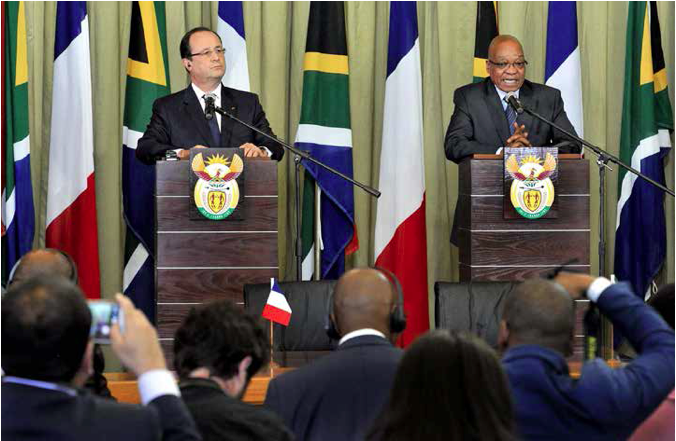 President Zuma hosted his French counterpart in a two-day State visit which saw the two countries sign agreements on rail and energy. The agreements are expected to boost gover ment’s effort to create jobs and stimulate the ailing economy.
President Zuma hosted his French counterpart in a two-day State visit which saw the two countries sign agreements on rail and energy. The agreements are expected to boost gover ment’s effort to create jobs and stimulate the ailing economy.
France is South Africa’s third-largest investment and trading partner in the European Union. Between the period 2004 and 2012, French companies invested R15 billion in South Africa, creating significant jobs.
Cooperation between South Africa and France cuts across a wide range of areas from defence, development cooperation, science and technology, arts and culture, to energy and agriculture.
Power utility Eskom signed an agreement with French energy firm GDF Suez for the establishment of a thermal power plant to the amount of R20 billion.
"Today marks yet another important mile- stone in the bilateral relations between South Africa and France. We have agreed that we need together to develop trade in a balanced manner," said President Zuma.
The two presidents also signed a contract for the overhaul of South Africa's ageing rail fleet by French firm Alstom, which is set to create thousands of jobs.
The contract spells out plans for replacing the country’s passenger train rolling stock as part of Passenger Rail Agency of South Africa’s (PRASA) 20-year plan to overhaul the rail system.
The deal will see Gibela, led by French company Alstom, building 3 600 passenger coaches for the rail agency over the next ten years. As part of the agreement, most of the parts used in the work are to be manufactured in South Africa.
President Zuma also encouraged businesses in both France and South Africa to expand cooperation in areas such as tourism, infrastructure development, agriculture, manufacturing, mining and beneficiation. “Already there are ongoing investments by French companies in major infrastructure projects in the country,” he added. Lecturer in international relations at the
University of the Witwatersrand David Hornsby says the agreements will boost relations between the two countries. “The agreements signed between South Africa and France, as they relate to energy production and rail development, brings the two countries closer together.
“France is providing important investment and expertise to help build South Africa's capacity in energy production and rail services. This means that both South Africa and France are partners, establishing bonds that will hopefully lead to further cooperation in other areas.”
Hornsby also said that the agreements mean South Africa is doing well in cementing its leadership position as an energy producer in the region and ensuring that its sophisticated infrastructure and logistics capacity is maintained.
The two presidents also discussed ways of tackling the different conflicts across the African continent, such as those in the Democratic Republic of Congo and the Central African Republic.
African court to deal with despots
African court to deal with despots sadminInternational relations
The African Union (AU) has committed itself to ensuring that leaders who commit crimes against their people are held responsible for their actions. This commitment is meant to promote human rights and democracy, as well as the rule of law and good governance on the continent.
 The commitment was made at the recent Extraordinary Summit of the Assembly of Heads of State and Government of the AU held in Addis Ababa, Ethiopia.
The commitment was made at the recent Extraordinary Summit of the Assembly of Heads of State and Government of the AU held in Addis Ababa, Ethiopia.
The Heads of State and Government also took decisions regarding the relationship between African states and the International Criminal Court (ICC), with special focus on the matter involving the Republic of Kenya’s President Uhuru Kenyatta and his deputy William Ruto.
The two are being tried by the ICC for allegedly instigating violence during the country's 2007 general election in which more than 1 000 people died.
Amongst other things, the summit decided to endorse the AU process of expanding the mandate of the African Court of Justice and Human Rights (AFCHPR) to try international crimes such as genocide, crimes against humanity and war crimes. One of the major resolutions taken at the summit is that African leaders must never be put on trial when they are still in office.
According to the AU, this is done to safeguard the constitutional order, stability and integrity of member states.
“No serving AU Head of State or Government or anybody acting or entitled to act in such a capacity, shall be required to appear before any international court or tribunal during their term of office,” said the AU in a statement.
The summit also decided that Kenya should send a letter to the United Nations Security Council (UNSC) requesting that the case against Kenyatta and Ruto be postponed until they have finished serving their terms as President and Deputy President respectively. This letter would be endorsed by all African states.
South Africa gives Zimbabwean SMMEs a shake-up
South Africa gives Zimbabwean SMMEs a shake-up sadminInternational relations
South Africa and Zimbabwe have agreed to step up the implementation of the small, micro and medium enterprise (SMME) cooperation signed late last year.
The cooperation commits the two countries to exchange visits and promote mutual trade. Recently qualified graduates will also be trained at technology centres in Zimbabwe. The commitment followed a meeting in Harare between Deputy Minister of Trade and Industry Elizabeth Thabethe and the Zimbabwe Minister of Small and Medium Enterprises and Cooperative Development, Sthembiso Nyoni, recently.
Deputy Minister Thabethe said the cooperation would assist Zimbabwean SMMEs and Cooperatives, and help to resuscitate the nine distress sectors identified by Zimbabwe to the South African government.
According to Thabethe, the South African government, through the Department of Trade and Industry, would play a key role in reviving the sectors identified by Zimbabwe.
“South Africa will assist the ministry through the Small Enterprise Development Agency (Seda) with the incubation strategy, commit human resources for skills transfer and also share knowledge of the SMME sector with the Zimbabwean government,” she added.
She said the commitment is in line with the newly elected government’s strategy to indigenise the economy, empower people and create jobs.
Minister Nyoni said she welcomed and appreciated South Africa’s effort to continuously support and work with the Zimbabwean government.
She added that her Ministry fully supported the implementation of the cooperation, and would observe and learn from the best practices that are currently being implemented by the South African government.
Govt and Tsogo Sun make a move to boost chess for learning
Govt and Tsogo Sun make a move to boost chess for learning sadminSport, arts and culture
Sport and Recreation South Africa (SRSA) and the Department of Basic Education (DBE) have teamed up with hotel group Tsogo Sun to use the game of chess as a learning tool in disadvantaged schools in the country.
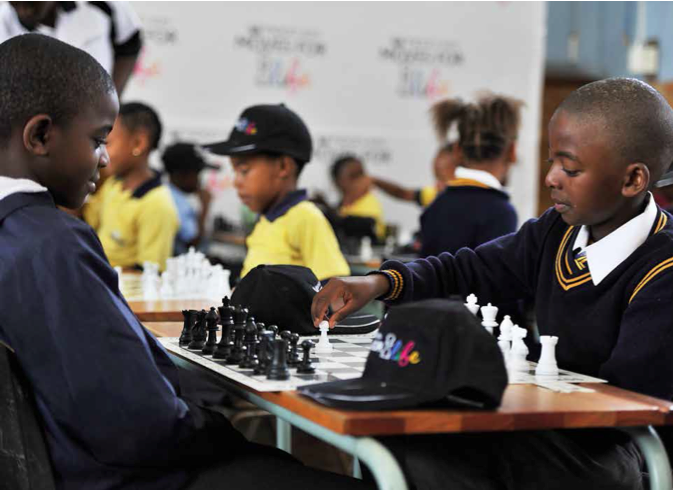 This initiative will see teachers being trained, thousands of learners being taught and chess sets being distributed at schools to improve learners'
This initiative will see teachers being trained, thousands of learners being taught and chess sets being distributed at schools to improve learners'
marks. Chess is ranked 16th among government’s top priority sporting codes for schools, and is a great learning tool to boost learners’ skill sets and development. According to SRSA, chess improves concentration, develops logical thinking, analytical skills, visualisation skills, decision-making skills, abstract thinking, planning skills, and memory, among others.
SunCares, which is Tsogo Sun’s corporate social investment initiative, has invested around R10 million in a national school chess programme, Moves for Life, over three years. Moves for Life is a local initiative which uses chess to improve education in maths, science and literacy. It targets children from as young as five years old and has already been implemented at more than 70 schools nationwide. Through the campaign over 50 000 school learners will effectively be taught maths, science and life skills through chess.
Marisa van der Merwe of Moves for Life says the integrated project uses education, sports and culture to help learners develop a different attitude towards their school work.
“There is a dire need to increase the maths, science and literacy capabilities of children all over the country,” says Vusi Dlamini of Tsogo Sun. “Statistics show that for every 100 children that entered grade 1 in 1999, less than 40 wrote matric in 2011, and only one may have matriculated with maths in higher grade. The fact is that to sustain South Africa’s global competitiveness, at least 25 out of 100 learners need to have matriculated with maths and science.” In light of this, Tsogo Sun heeded government’s call and has come on board to work together to do more. The programme is divided into three key elements, MiniChess which targets Grade R to Grade 3 learners, MasterMoves which is for learners aged nine and older, and teacher training.
The first phase saw 400 teachers being trained to carry the campaign out in their schools and by the end of the year about 15 000 children will be on their way to grasping the wonders of chess.
To see if the programme meets its desired effect of improving learners’ development, the University of Johannesburg has also made its move to conduct impact studies on the learners, teachers, schools and communities. Baseline studies are underway and long-term impact studies will be carried out at regular intervals for the next three years to monitor and evaluate the value of chess in education. “We truly believe that Moves for Life will see children improving their comprehension of maths, science and literacy and that it will have a beneficial impact on their development in their school years, laying a strong foundation that can be built on throughout their lives,” says Dlamini. “We are privileged indeed to be in a position to make this potentially significant contribution into children’s lives.”
SA ready to host Africa’s soccer giants
SA ready to host Africa’s soccer giants sadminSport, arts and culture
It’s all systems go for the third edition of the 2014 Orange African Nations Championship tournament. From 11 January to 1 February 2014, the eyes of African football fans will be on South Africa as 16 teams compete in the continental showpiece.
The tournament will see 16 teams in four groups made up of players playing in local leagues competing for the title of African champions.
Spokesperson for the Local Organising Committee (LOC) Sipho Sithole says the participating teams have inspected the host cities and they are happy with the preparations.
“All the teams have now conducted their host cities inspections and they are satisfied with the level of preparedness by the LOC.
“We are also happy with the host cities readiness in terms of team hotels, training venues, stadiums, and team transport.”
Sithole added that the LOC will raise the 16 flags of all the participating teams on 8 January and the host cities will follow by raising flags of the national teams playing in their backyard.
Cape Town will host matches for both Group A and B. South Africa, Nigeria, Mali and Mozambique will lock horns at the Cape Town Stadium in Group A matches. Group B will see a tussle between Zimbabwe, Morocco, Uganda and Burkina Faso at the Athlone Stadium.
Bloemfontein will host Group C matches with Ghana, Libya, Ethiopia and Congo battling it out for progression to the quarterfinals of the tournament. Polokwane will host the last group at Peter Mokaba Stadium. The group will be contested by Burundi, Gabon, Mauritania and the Democratic Republic of Congo.
Sithole concluded that the LOC has been working closely with the host cities and Passenger Rail Agency of South Africa (PRASA) to provide transport to ferry fans to and from stadiums.
“We are finalising our negotiations with PRASA but we are quite confident that public transport for the fans to the stadiums will not be a problem. The host cities are also making provisions for the movement of fans to and from the stadiums.”
Preview of groups
Group A
South Africa: Hosting the tournament for the first time, the host nation will be expected to perform better with the backing of the home crowd. Drawing players from one of the best run leagues in Africa, South Africa’s chances of progressing to the next round will be very high.
Nigeria: The rivalry between the Super Eagles of Nigeria and Bafana Bafana will take centre stage as the two teams compete against each other. With some of the players who won the 2013 Orange African Cup of Nations playing in the local league, the Eagles will be a tough team to beat.
Mozambique: With most of its international stars plying their trade in the South African Premier Soccer League, Mozambique might be the whipping boys of the group.
Mali: The West African nation, just like Mozambique, have their players outside the country and are likely to be beaten by the more organised South Africa and Nigeria.
Group B
This will be a very interesting group, pitting countries from different parts of the continent against each other - Zimbabwe with their southern African flair and Morocco with their imposing North Africa style. The Ugandans will bring the central Africa type of football while Burkina Faso will bring the physical and dominant West African style of play.
Group C
Ghana, Libya, Ethiopia and Congo will contest this group and Ghana with their experience in continental competitions is likely to dominate the group with Ethiopia coming second. The Ethiopians will be high in confidence after making it to the final round of the 2014 Brazil World Cup qualification. Libya and Congo will occupy the last two spots in the group.
Group D
The Democratic Republic of Congo is likely to win this group boasting players from the competitive TP Mazembe. Burundi, Gabon and Mauritania will battle it out for the second spot in the group.
